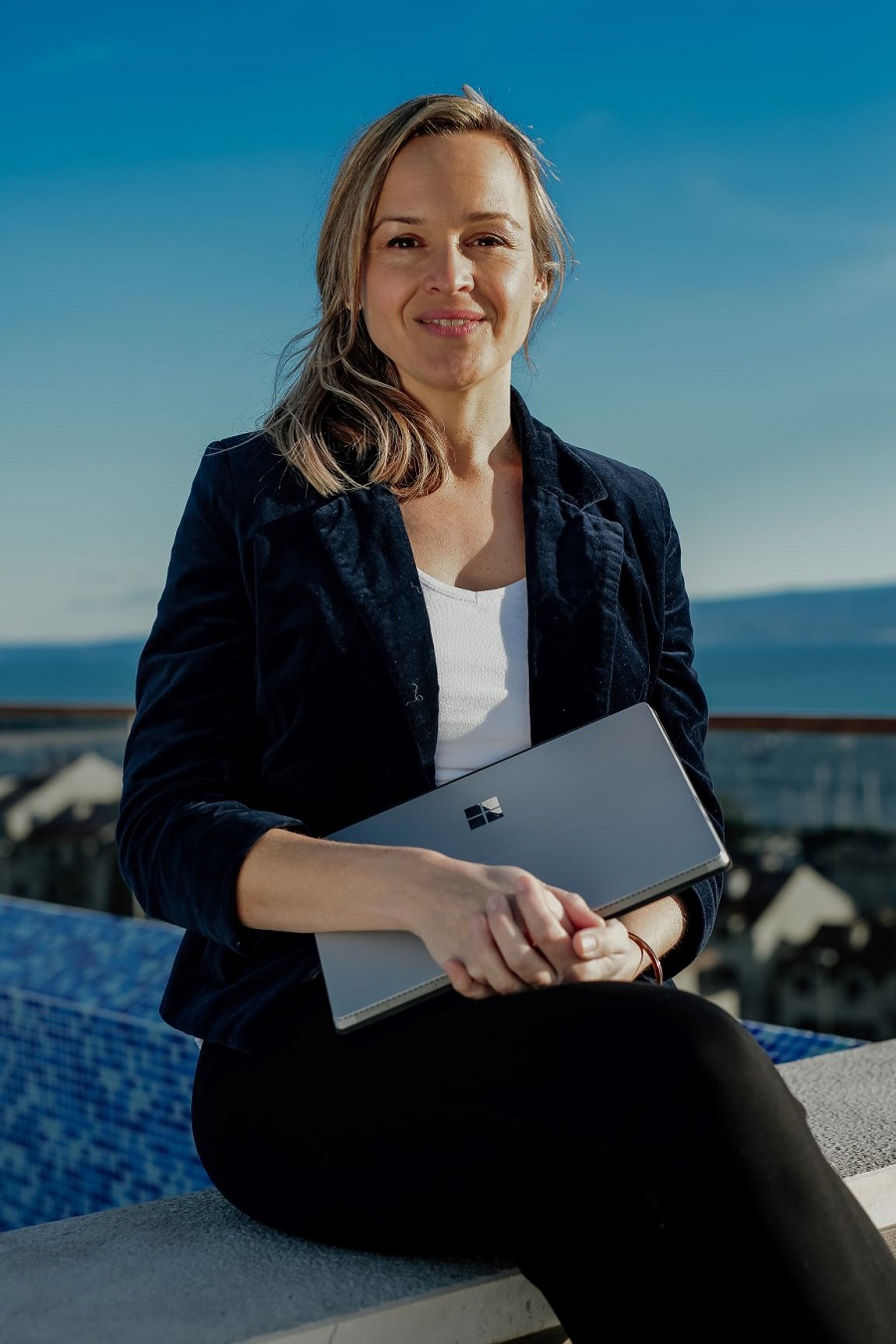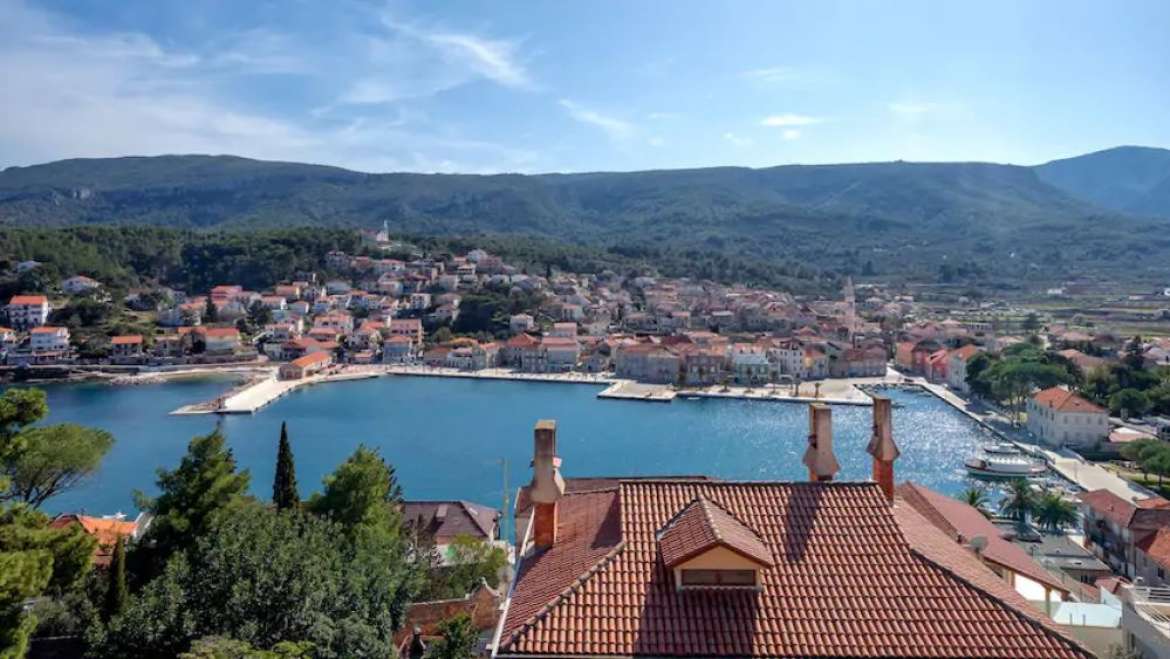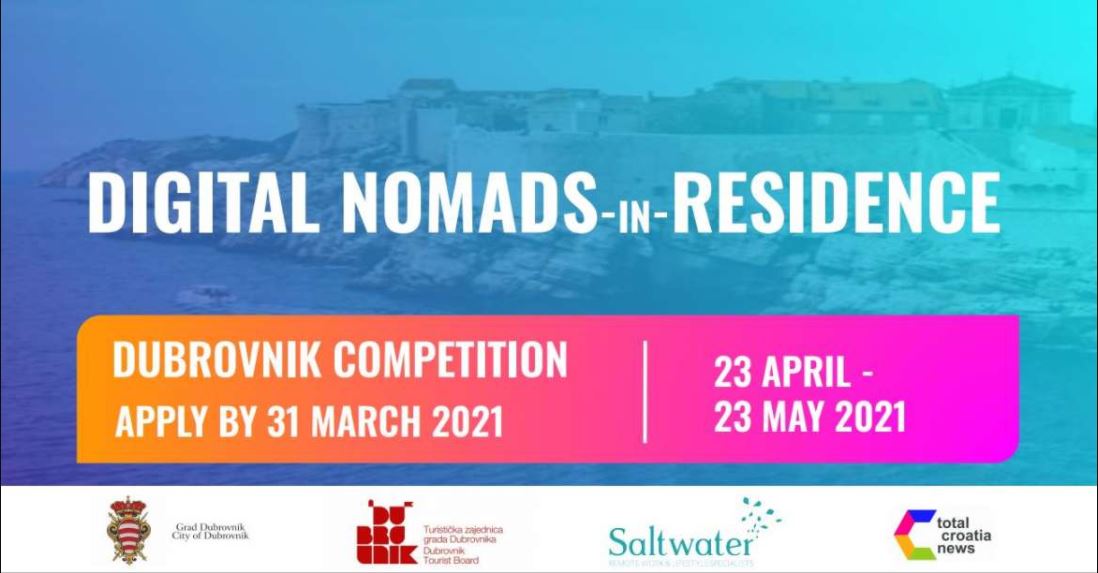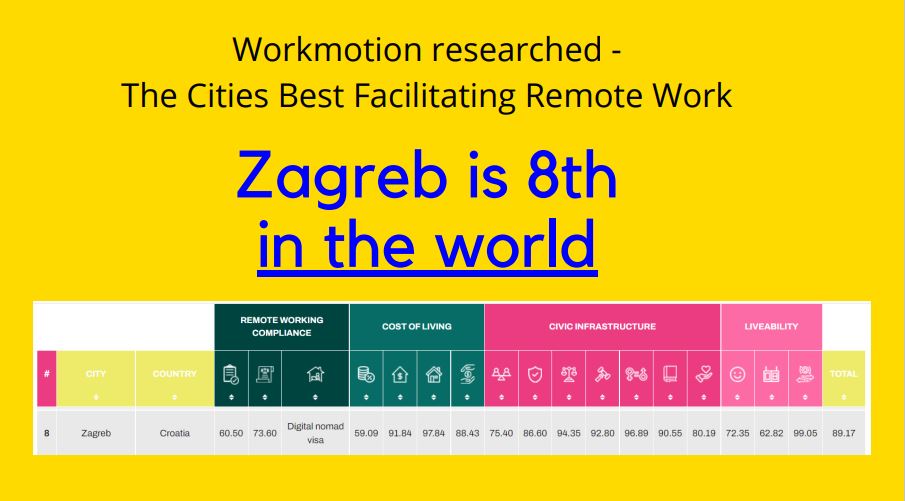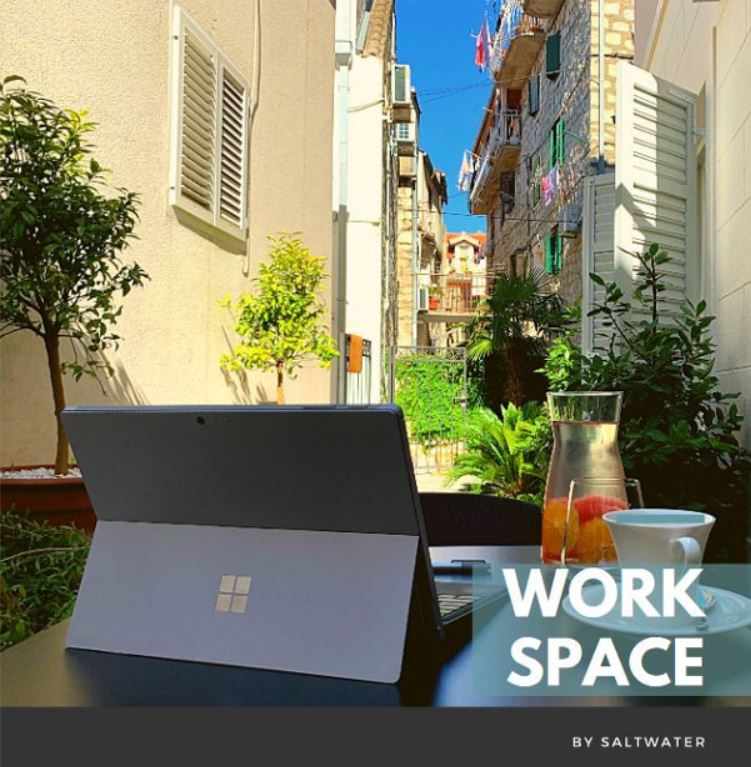Just 6 Days Left to Apply: Meet the Dubrovnik DN-i-R Stunning Regional Tours
March 25, 2021 - With just 6 days left to apply for the Dubrovnik DN-i-R (Digital Nomads in Residence) competition, a look at some of the magic that awaits the 10 lucky winners.
(This article is sponsored by the City of Dubrovnik and Dubrovnik Tourist Board.)
There are just six days to go until applications close for the Dubrovnik DN-i-R competition, the first of its kind in the world. Ten lucky winners, to be announced on TCN on April 5, will be guests of the city of Dubrovnik for four weeks from April 23. The Dubrovnik DN-i-R programme will be the first such cooperation between a destination and resident digital nomads, working together to develop the destination's strategy for its digital nomad offer.
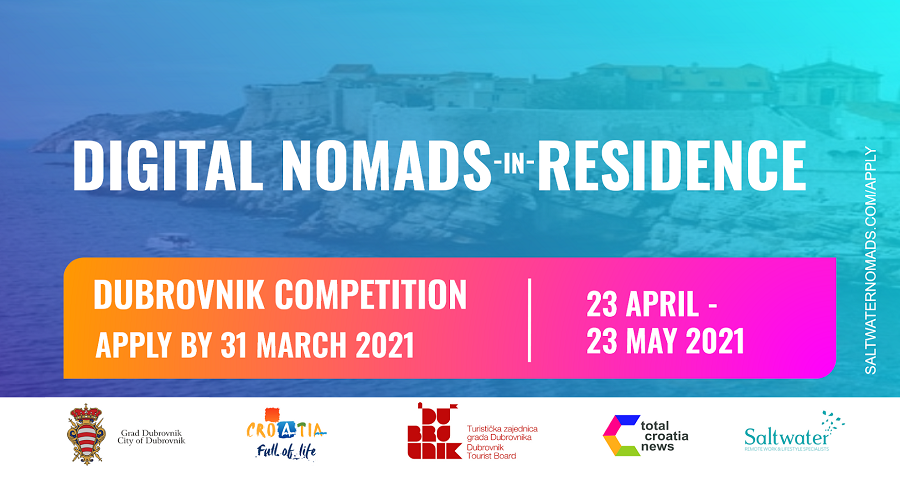
The concept, developed and implemented by Saltwater Nomads, is a collaboration with the City of Dubrovnik, Dubrovnik Tourist Board, and the Croatian National Tourist Board, with media support from TCN.
In addition to the free accommodation, specialised workshops and other activities, Dubrovnik's ten remote-working guests will be taken around the region to explore some of the magic of Dubrovnik, both inside - but especially outside - its city walls.
I always find it amusing to hear tourists complaining that there is nothing to do in Dubrovnik once you have been around the old town. Nothing could be further from the truth! Add Dubrovnik, the city, to Dubrovnik, the region, and you have a quite sensational offer. And that is before you consider the gems right across international borders, such as the UNESCO World Heritage Sites of Mostar in Bosnia and Hercegovina and Kotor in Montenegro.
Considering applying but not yet convinced? Perhaps this official overview of the excursions will help persuade you. You can find out more about the application process here.
1 - Tour of Dubrovnik Old Town
– sightseeing tour of the Old City of Dubrovnik and the city walls with the local guide – organized by Dubrovnik Tourist Board
Learn more about Dubrovnik on the official Dubrovnik Tourism Board website.
2 - Korcula
– a weekend trip to Korcula island (sightseeing tour of the Old City of Korcula – birthplace of Marco Polo; hiking /cycling from town Korcula to Lumbarda, winery visit; visiting other places on the island – Blato, Vela Luka…) – organized by Korcula Tourist Board
Korčula – this central Dalmatian island stretches out parallel to the nearby mainland in a west-east direction. The island is 46.8 km in length, with an average width of 5.3 to 7.8 kilometres and a surface area of 270 km2, making it the sixth-largest island in the Adriatic Sea. It is separated from the Pelješac peninsula by the Pelješac Channel, only 1270 m wide at its narrowest point. The island of Korčula is indented with a series of bays and coves. Exploring the island only adds to its natural beauty: every part of it is worth exploring. Near the city of Korčula is an archipelago of twenty uninhabited islands covered in dense macchia thickets and accessible coastline: on some, the smooth stone slabs along the shore are perfect for sunbathing. The island of Korčula has been inhabited since prehistoric times, with past traces of life being uncovered at many places on the island. The oldest finds were stone knives from the Neolithic age discovered on the islet of Badija near Korčula. The site with the richest Neolithic age finds is Vela spilja (Large Cave) at Vela Luka.
Learn more about the incredible island of Korcula.
3 - Mljet
-a weekend trip to Mljet island – one of the 8 national parks of Croatia (active tour of the island – cycling, hiking, kayaking, visit of the national park and 2 saltwater lakes, boatride to the Odysseus cave…) – organized by Mljet Tourist Board
Mljet – the first large island we come upon while sailing the from the southeast in Croatian waters. In historical times, the entire island was inhabited by the Illyrians. The Greeks, on their way to Lumbarda (island of Korčula) and other Adriatic settlements arrived there and stayed due to the water and bad weather. The island was also inhabited by the Romans, who left behind archaeological remnants, the most significant of which is the palace in Polače harbor, as well as the names of the island heights, hills and reefs, unquestionable proof of their residence on the island. Mljet is Croatia’s greenest island with lush Mediterranean vegetation, clear and clean sea, a gentle, sandy shoreline and a wealth of underwater sea life. This island is well known for its southern sorts of white and red wine, which receive a special flavour and aroma from the sun and the specific Mljet soil. The island is also well known for its goat’s cheese and honey which, in the past, was served in the emperor’s courts, and mostly for the warmness with which the islanders greet visitors to their island.
Learn more on the official Mljet Tourist Board website.
4 - Konavle
– one-day excursion to Konavle area (sightseeing of the town Cavtat, museum in the village Cilipi, Old watermill in village Ljuta and some other sights and villages). – organized by Cavtat Konavle Tourist Board
Konavle is a region with particular natural beauties and contrasts: mountain and valley, green hills and naked stone, the blue and the green or, as called by the inhabitants of Konavle, "Gornja" and "Donja Banda". Fringed by the Konavle mountains in the North, bordered by the Adriatic Sea in the South, it reaches from the entry into the Bay of Kotor to the peninsula of Prevlaka in the East, and in the West, it inclines down to the cosy coves of Obod and Cavtat. The preserved natural, unique and exceptionally precious rural architecture, numerous monuments of the thousand-year-old history of this area, traditions that are hundreds of years old and have been kept through folklore, the distinctive traditional costumes of Konavle and the Konavle embroidery, the harmony of man's life and nature …all this renders Konavle unique and recognisable.
Learn more on the official Cavtat Konavle Tourist Board website.
5 - Primorje
– one-day excursion to Dubrovnik Primorje area (visit of town Slano, the Rector’s palace, villages up the hills…) – organized by Dubrovacko Primorje Tourist Board
The Coast of Dubrovnik is a gentle region of olive groves and vineyards, with an indented shore and lavish vegetation... Slano is the biggest and most important small town and a community centre. Traditionally, the villages in the immediate hinterland are municipally linked to it, forming a constituent part of the Community of the Dubrovnik Coast. Slano is 30 kilometres from the centre of Dubrovnik. It is situated in a spacious and beautiful bay of the same name, which was a flooded valley, next to the walled shoreline, opposite the island of Šipan and divided by the Koločep Channel. Slano is attractive due to its numerous pebble beaches, lush vegetation and pleasant climate.
The bay is protected from the wind, so that it is an ideal haven and anchorage for ships, boats and yachts. Its economy is based on tourism with accommodation provided by the hotels “Admiral” and “Osmine”, private pensions, apartments, campsites and other venues; also on agriculture (olives, vines, fruit), fishing and other marine activities.
Learn more on the official Slano Tourist Board website.
The final date for applications is March 31, so there is still time. It is going to be a fantastic 4 weeks in a dream destination. Full details on the competition, rules and application process on the Saltwater Nomads website.
Learn more about the programme in this in-depth interview with its creator, Saltwater Nomads CEO Tanja Polegubic.
The Mayor of Dubrovnik, Mato Frankovic, has been heavily involved in the city's Dubrovnik digital nomad initiative from the start. Mayor Frankovic talks about this, as well as other tourist topics, in this recent TCN interview.
Saltwater Nomads' Tanja Polegubic on Dubrovnik Digital Nomad-in-Residence Programme
March 18, 2021 - There are less than 2 weeks to go until applications for the Dubrovnik Digital Nomad-in-Residence (DN-I-R) competition closes. An in-depth interview with competition creator, Tanja Polegubic of Saltwater Nomads.
The pandemic has been a strange time for all of us, but it has also brought new directions and opportunities. I would never have expected to have been involved in the organisation of Croatia's first-ever digital nomad conference, Dubrovnik for Digital Nomads.
2020 was a great year for the digital nomad sector in Croatia, culminating of course in the introduction of the digital nomad permit on January 1. Now nomads meeting the criteria are able to live for one year in Croatia and work remotely. TCN teamed up with one of the early pioneers in these fairly uncharted waters, Saltwater Nomads. Dubrovnik was the first destination to see the value in what we were offering, we have been working with them ever since.

Saltwater CEO, Tanja Polegubic, designed and delivered the October conference, and she is also behind the Dubrovnik Digital Nomad-in-Residence competition, a unique concept which has attracted considerable international attention. And some VERY strong early applications.
There has also been some confusion about the competition and what we are trying to achieve, and I thought that the best way to explain more would be to get young Tanja to explain in more depth.
(Photo by Damira Kalajzic)
It is being billed as the world's first digital nomad-in-residence competition, in partnership with the city and tourist board of Dubrovnik. Can you briefly explain what that means exactly, and what you are trying to achieve?
The notion of a scholar- or artist-in-residence is a globally recognised concept. These residencies are models of collaboration; they bring diversity to an institution, and foster an environment for research, knowledge sharing - and in this case, the goal will be implementation.
The selected DN-I-Rs will participate in design thinking workshops and present their findings on shaping a Digital Nomad Friendly city.
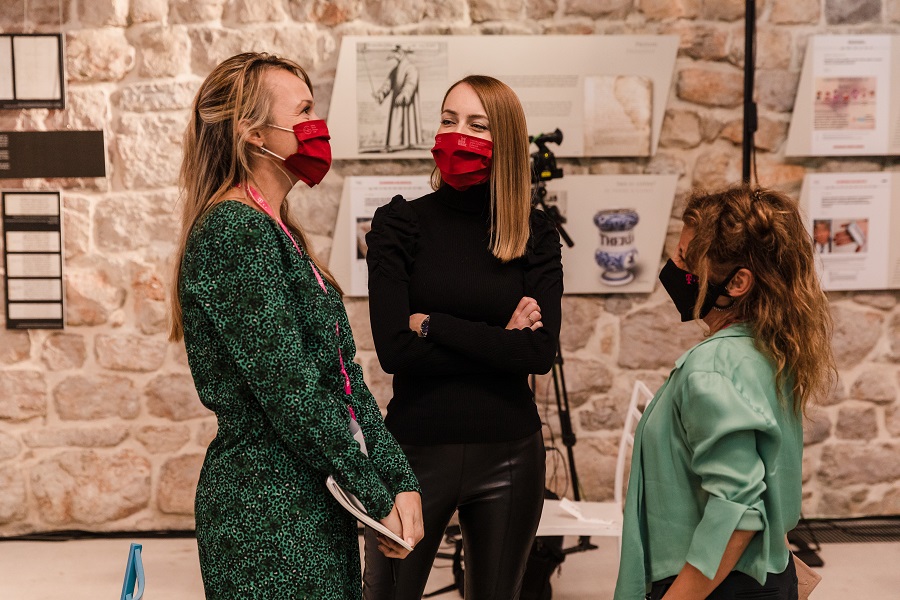
The first goal in working with Dubrovnik was to build awareness about the city and what it can offer for digital nomads, as it was not previously known for this - but was certainly infamous! This is in motion, with much international media coverage about Croatia’s most famous city. Like most places, it is undergoing a transformation - everyone knows what Dubrovnik looked like before. Digital nomads are only one aspect of this. We are using a co-creation model to look at ways digital nomads fit this new direction.
You are offering 10 lucky winners the chance to spend 4 weeks as guests of Dubrovnikworking with the city to develop their strategy to better serve digital nomads. Who is eligible to apply, and what kind of applicants are you looking for ideally?
Anyone who can be a digital nomad for a month can apply. This might be first-timers, who are perhaps working from home right now - or a seasoned digital nomad travelling the world.
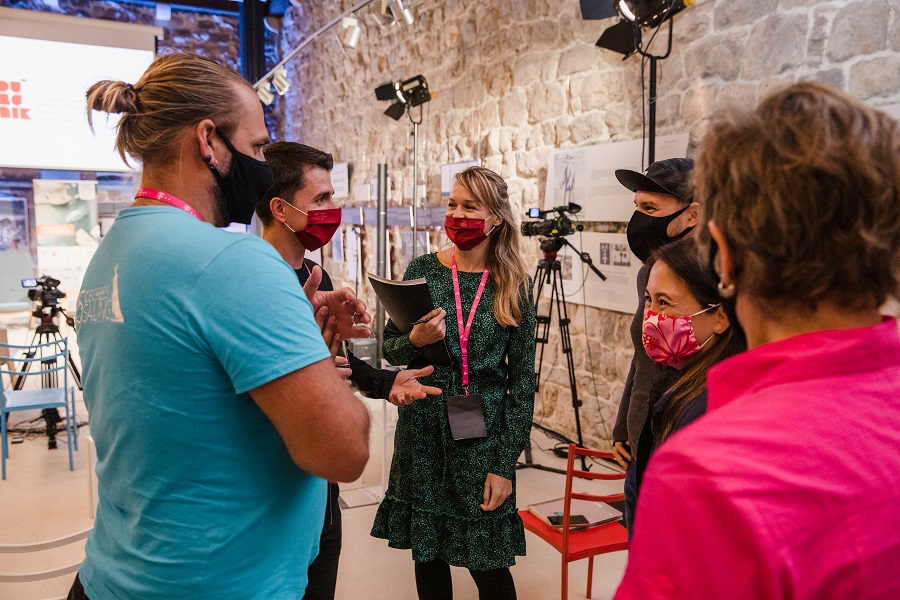
We are looking for applicants who will bring value to the program. This isn’t a free ride - even though you’ll go on some amazing local area tours, free! We want to see evidence you will commit and can make a contribution. We’re looking for diversity in age and professions. We also need to know what skills you will bring, and we have answers such as “community building, playing the ukulele, history knowledge” so it is really about what an individual brings and looking at how that will fit in a group. We don’t expect people to have experience doing this before,or1 million followers
If you are asking for a hot tip - I can only say, ensure it reflects your personality - we want to see the real you. Also, do some research on Dubrovnik to inform the reason WHY you are applying.
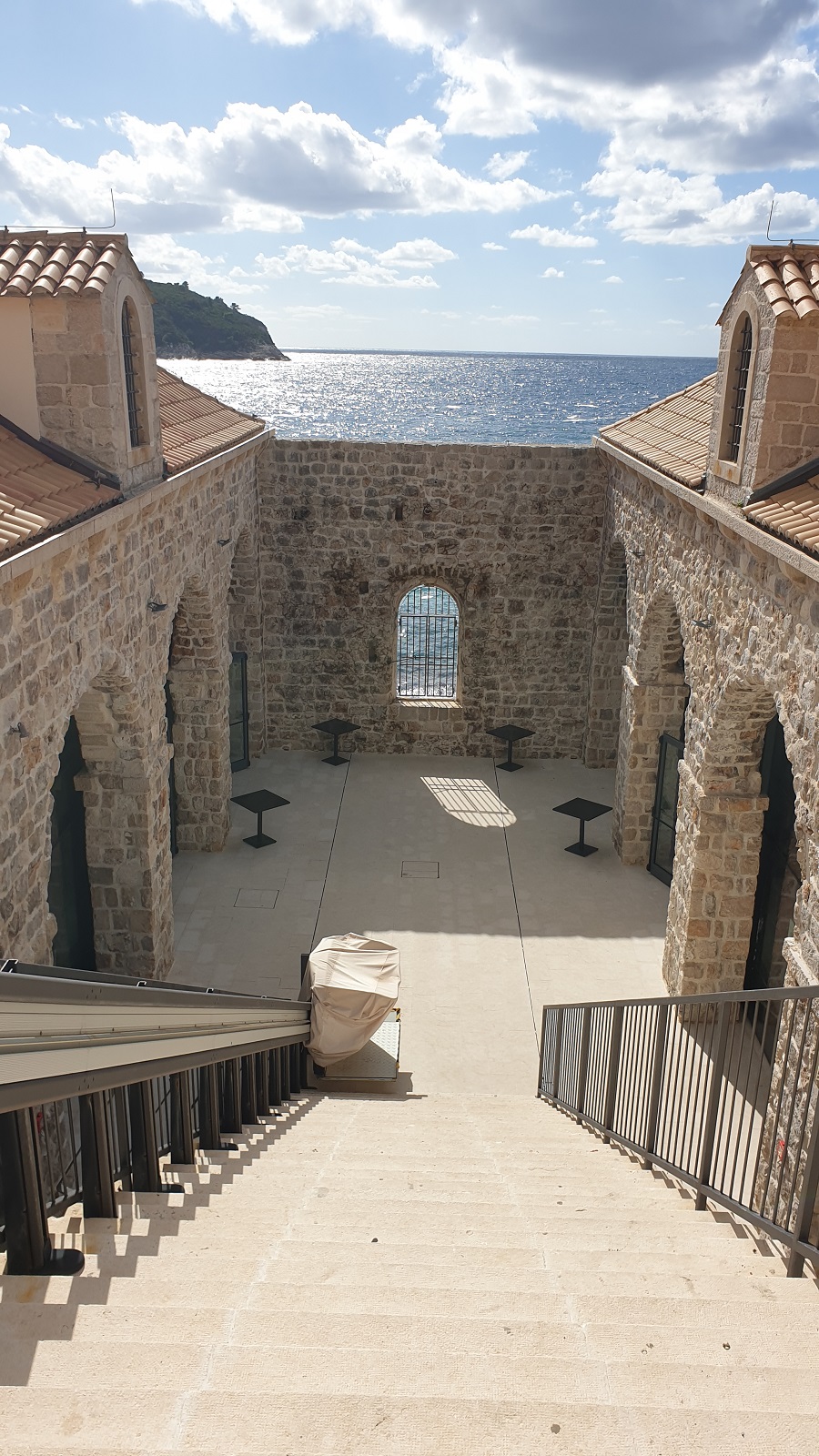
(The Lazareti, the original quarantine premises for the Dubrovnik Republic, which is where the first digital nomad conference in Croatia was held)
The application period is already open and runs until March 31. How has the response been so far?
The applications we’ve received so far are diverse and strong. As it’s the first time it has been done, this will be the benchmark. There are also COVID19 factors to consider. Not many people are sure of their ability to travel right now. On that note - COVID19 safety is our high priority and we are operating within the prescribed guidelines and in constant consultation with the City about this.
We are confident a high-quality group will emerge.
There will be other opportunities to be involved, so anyone who applies will get this information, first.
Your company, Saltwater Nomads, is providing both the concept and the delivery of the Dubrovnik Nomads-in-Residence programme. Why Dubrovnik?
First Movers
Dubrovnik was the first to recognise and follow through on the idea to welcome digital nomads to an external audience.
Sustainability
Dubrovnik was, according to some reports, the second most overcrowded city in the world. I watched on during the war. I visited for the first time in 2001 as a volunteer at Trsteno Arboretum. I considered it as a destination when I first began researching opening a cowork in 2015. Its history is … epic. It is Croatia’s best-known city, so when it prospers, this can only benefit every other city in Croatia - nomads travel. So, from bringing wider benefits to Croatia, to delivering a more sustainable approach - the why is clear to me.
Action-oriented
Getting things done in Dalmatia can be difficult, drawn out and tiring. There’s a lot of skills atrophy. Complaints, with no action. A brain drain. Anyone with a more open-minded and longterm vision, in this case a city - is where energies should go right now. Local council and institutional support is key.
Dubrovnik has demonstrated it “gets it”, and I forgot for a while what that looked like. I am also pleased to say, other cities are taking progressive steps, and were perhaps limited due to many factors - so I am confident Dubrovnik is just the start.
Keep an eye out for new projects in Zagreb, Bačvice beach Split and an island.
You are known as one of the pioneers of the remote work initiative in Croatia, opening your first co-working space back in 2017, and there has been a lot of buzz regarding the Croatian digital nomad 'visa', or permit. How has the scene changed in Croatia since you started?
I started researching opening a coworking space here in 2015. My father became ill, and ultimately passed away, so I did not come until 2017. Prior to Covid-19, it was a tough run on the coast. You’re too expensive in Summer, and there’s not much to offer in Winter, so no one knows about you and goes to Bali instead. Also, no one knew what I was doing - but my first “walk-in” the first month I opened was from Google. I wasn’t even ready yet, but I took this as a sign I was onto something. In that time, I branched out to do a range of project work, and met a lot of people and discovered the kind of person I would want to do business with - having had no experience in business - and really learning a lot. I am still learning.
The pandemic (and as a result, working from home) has changed everything. Croatia’s new digital nomad permit has turned it into turbo mode. There are more online services due to COVID19. These are progressive steps to making Croatia ideal for digital nomads.
The thing I most expect to change, is a rise in people with Croatian origins also considering Croatia as their office. I already see it, in fact.
What are the biggest challenges for Croatia and its tourism providers in order that they fully take advantage of this opportunity? I am struck, for example, by high levels of enthusiasm to offer 'digital nomad tourism' without necessarily a clear understanding of what that entails.
This is a long-term journey arising out of the pandemic. Digital nomads are just a part of it. While it is great to see enthusiasm, a more informed approach and diversification would be wise. Can digital nomads be one form of moving toward this? I believe so.
I am reading and talking to some of the more visionary thinkers to offer something other than tourism. It is my belief that a digital nomad audience can deliver capacity-building opportunities regular tourism cannot, for example, by knowledge sharing and showing “you can work from anywhere” helps the younger generation see they have options. Also, Croatia is a place which can be a base for different sectors. Again, to touch on Croatians outside Croatia - if the rest of the world is coming here to work, why can’t you - but in this case, actually invest or run a business, which a non-EU national on a digital nomad permit currently cannot.
The biggest challenge, currently, is education. Providers need to know why and how a digital nomad is different to a regular tourist.
For example, this includes longer stays, a desire for more immersion in community and feeling at home.
Longer stays are the best example - it is hard for someone who has previously made 8,000 euro in 1 month to now offer the same apartment for 800 euro. Thus, landlords must decide if they will offer monthly bookings vs nightly. This is currently, and I expect will continue to be, Croatia’s greatest challenge; it impacts a decision on where to stay and will be a deterrent if prices and convenience are not available year-round. Some incentives for more properties to offer this is one way which can help.
Also, knowing what to offer.
A lot of people are working from home - the kitchen table is not always suitable. Nor is slow or unreliable internet. People are travelling with or adopting pets. They are self-catering more. They require everyday household items - such as more coathangers. It really can be that simple. You need to consider utilities pricing, and then things like whether you are registering a nomad as a tourist, or will have a lease - as the taxes differ. There’s a lot of new information and adjustments to be made. Some are quick fixes, some need more investment.
These are areas which can be addressed, and I am confident Croatia offers everything - Lifestyle being number 1.
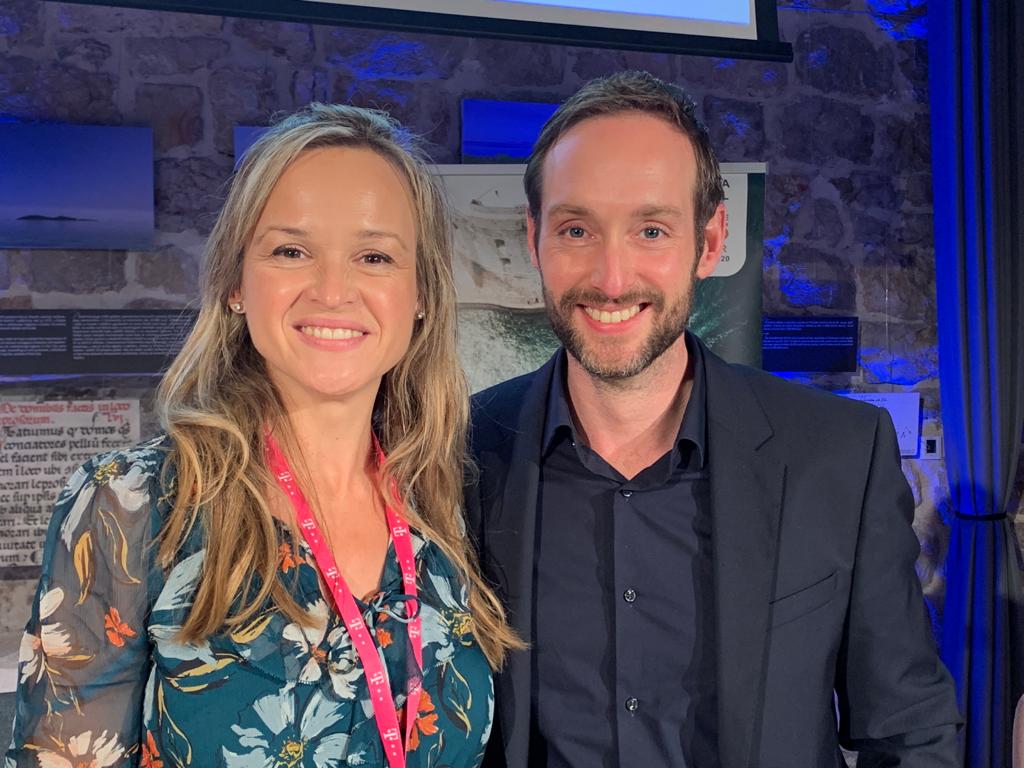
(With Digital Nomad Association co-founder, Jan de Jong)
You are also a co-founder of the Digital Nomad Association in Croatia. Tell us a little about that.
Working in a tough town with a tough business to make viable has meant I’ve encountered almost every problem imaginable for digital nomads. I enter the DNA bringing these insights, as I’ve directly been impacted by the same issues a digital nomad, or business serving digital nomads, may face.
Being part of DNA Croatia with Jan and Karmela is one of the greatest things to come out of last year. I learn every day from the different skills my colleagues have, and we each bring a different perspective.
The association is about strength in numbers. Our current focus is heavily administrative, and the next focus is to drive membership, and collectively work toward meeting our five goals which are: representation (eg. to government bodies), community building, education, information and certification (eg. ‘digital nomad friendly’ properties). I also believe we were the first in the world with such an association. We really saw the need to get things right from the start of the permit being launched. How? We bring a range of collective expertise.
There’s entrepreneurial, community work and NGO experience in our founding team. Every day, we hear from and factor in how people in Croatia or digital nomads want to be served. Our aim is to bring all this together.
Each one of us is passionate, has a strong network - and is actively contributing to make Croatia realise its potential. Even in the face of occasional criticism - but from what I see, the ones who criticise are quick to give an opinion, but haven’t done anything to change things.
And finally, what are you hoping the end results will be of the programme, and how will you measure its success?
The expectations are high. Success is a happy City and Tourist Board, number one. Next are the participants. We’re promising a once-in-a-lifetime experience, so it’s a big task.
We’re confident the workshops will be engaging and involve members of the community in a co-creation model. For example, the tourist council is a knowledgeable base of experts to engage, through to tour guides, historians, you name it. The structure of the program will determine who is identified - the first task is to see how the digital nomads experience the City themselves. It then calls for the involvement of relevant local stakeholders. This is built into the co-creation model. Some locals have already reached out, which is wonderful.
Enjoyment
The tour program made my jaw drop (I don’t know how anyone will get any of their regular work done with all there is to do)! The participants are there to enjoy being in Dubrovnik for a month as special guests of the City and Tourist board. It has to be a positive experience, which they will promote, with authenticity.
Sustainability
It is a thrown-around term. Still, our efforts are intended for there to be ongoing benefits beyond the four weeks of the DN-I-R program. Will our findings and recommendations be able to be implemented? Will they benefit incoming digital nomads and locals? Sustainability equals success.
Local buy-in
The City and Tourist Board supports this and recognises its value. During the program, which uses a co-creation model, we continue to look to the City and Tourist Board for guidance on who and how to engage with the community they serve. When a number of new products and services emerge - as a result of this program and other efforts, then it’s a win/win.
Beyond Dubrovnik’s walls
Success is other locations - in the region or beyond, adopting a similar or modified approach - i.e. making the effort to do something to suit a remote working audience. It doesn’t have to be so intensive, but the roadmap is expected to have some universal ‘tweaks’, but of course there will be location-specific things to implement.
Numbers
The moonshot is to be profiled as a best-practice example for cities adopting new strategies to cater to remote workers and demonstrate Croatia has some of the best places to live by more digital nomads coming. We are slow when you compare us to other established Mediterranean countries - so we are making up for it. For a tourist-reliant city to make such a move, this has already drawn the attention of urban planning publications - so already, the world is watching. Success is when they start coming to live and work here.
There is still time to apply, with applications accepted until March 31. Learn more about the competition rules and apply via the official Saltwater entry form.
For more news and features about digital nomads in Croatia, follow the dedicated TCN section.
Dubrovnik Mayor Mato Frankovic on Digital Nomads, US Flights, 2021 Season
March 12, 2021 - With the pandemic affecting its 2020 tourist season more than most of Croatia, Dubrovnik is actively gearing up for new markets and strategies for 2021. TCN caught up with Dubrovnik Mayor Mato Frankovic.
Nowhere suffered more in Croatian tourism last year than its most famous destination - Dubrovnik. Located in the far south of the country, it is heavily reliant on flight and cruise ship tourism for the bulk of its tourism business. Unlike more northern destinations in Croatia which were more accessible by car, Dubrovnik was forced into a rethink on its tourism strategy to deal with the current pandemic realities.
Rather than sit back and hope for the best, Dubrovnik Mayor Mato Frankovic has taken the initiative to position the Pearl of the Adriatic as a prime destination in the emerging digital nomad tourism opportunity. Dubrovnik hosted Croatia's first-ever digital nomad conference in October last year, Dubrovnik for Digital Nomads, an event organised by Saltwater Nomads with support from TCN.
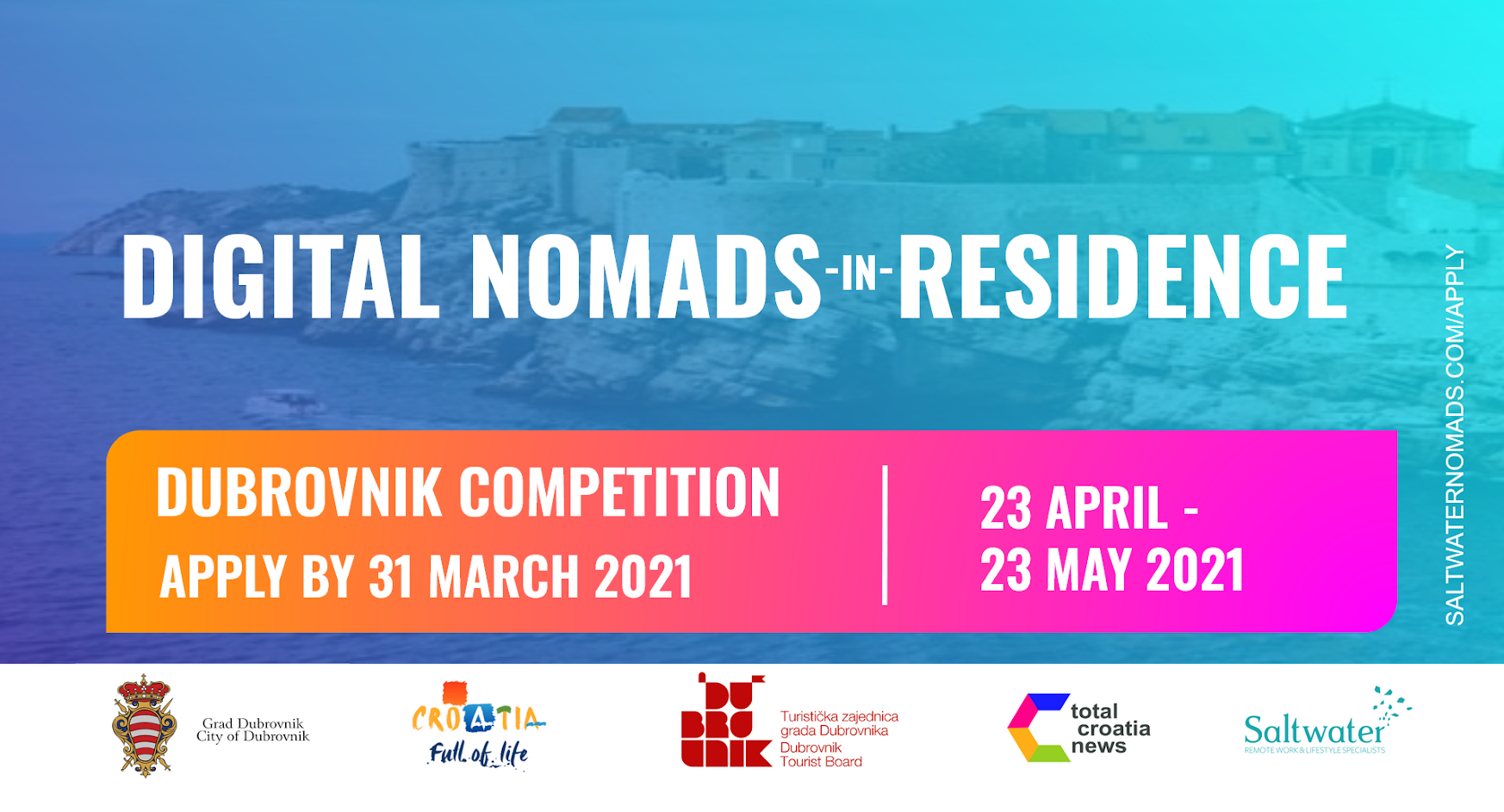
(Applications for the competition close on March 31 - you can learn more about it and apply here).
Inspired by the success of that conference and the global interest it generated, the Dubrovnik Mayor and his team have been working closely with Saltwater Nomads and TCN to develop a strategy to attract remote workers to the city. Last week, the Dubrovnik Digital Nomads-in-Residence competition was launched, the first of its kind in the world.
TCN caught up with the Dubrovnik Mayor to talk more about that, as well as the 2021 season prognosis, rumours of direct flights from New York, Dubrovnik's perception of an expensive destination, and more.
1. You are one of the most famous destinations in the world, heavily reliant on cruise and flight tourism. What was the full effect of the pandemic on Dubrovnik tourism last year?
The figures are the best thing to look at when it comes to testifying to the situation, and they say that Dubrovnik ended the year with 20 percent of the total number of overnight stays when comparing to 2019. The fact that we depend the most on flights hit us the hardest. On top of that, among the most affected in the entire tourism industry is the cruise industry, which also makes up a significant part of tourism in Dubrovnik.
2. In October, you hosted Croatia's first-ever digital nomad conference. Tell us about the initiative and the opportunity for your city.
Turning Dubrovnik towards digital nomads is part of a serious focus being placed on diversifying our tourist offer and developing new facilities. The COVID-19 pandemic has significantly affected tourism-related economies, and Dubrovnik has felt significant consequences in this regard. At the same time, we have become aware of the fact of just how many people work from home today and how their numbers will only continue to grow over time, and that there are a certain number of people who can do their job from anywhere in the world. Due to this we noticed the possibility of expanding our offer to people who want to stay in a beautiful and comfortable environment, be on a holiday of sorts, and still do their jobs online.
In addition, these are special types of tourists who stay in a destination for longer than average and want to participate in local life by consuming content intended for the local population, not exclusively for tourists. In this sense, the promotion that is realised through the competition we launched is extremely important to us, especially if we know that a large number of influencers are among those individuals.
3. The Dubrovnik Nomad-in-Residence competition is a unique concept. Tell us a little about the type of applicant you are hoping to attract and what your expectations are from the programme.
We expect the programme to map Dubrovnik out as a desirable destination for digital nomads. We want to get first-hand feedback on what is good for digital nomads in Dubrovnik and what needs to be improved. We also expect that in this way we´ll be able to promote the city as a tourist and destination for digital nomads and we believe that all those who will come to stay here will also become ambassadors of Dubrovnik across the world.
4. If you had to summarise in a sentence why Dubrovnik is a great place for digital nomads, what would you say?
I´d say that Dubrovnik has everything you need for a pleasant time when it comes to both working and staying here - beautiful surroundings and a good internet connection, as well as everything that makes life somewhere more beautiful, from the tradition of living in the Mediterranean to the local customs to the very many sunny days per year.
5. There are perceptions in some quarters that Dubrovnik is very expensive and there is not much to do once you walk through the old town. What would you say to that?
Of course, Dubrovnik has its exclusive facilities and offers, as have all of the world's top destinations. But Dubrovnik has an offer for everyone, from hostels and private accommodation to facilities in attractive and expensive positions, from exclusive restaurants to pleasant city cafes, where Dubrovnik´s locals sit down to drink their favourite coffee.
The historic core itself has so many nooks and crannies that you can go on discovering places for weeks, there are also numerous museums and events. For example, if you are here in winter, you simply have to feel what Christmas in Dubrovnik is like, as well as our thousand-year-long tradition related to the Feast of Sveti Vlaho, the patron saint of Dubrovnik, whom we celebrate on February the 3rd. (You can read more about TCN's impressions of a visit to the Feast of St Blaise a few years ago here).
In the immediate vicinity near the historic centre of the city is the Lokrum reserve, the Arboretum in Trsteno, the lookout on Srdj, the Elafiti islands with their sandy beaches. The advantage of Dubrovnik is its truly phenomenal environment, from Konavle to Peljesac and the island of Korcula, which both offer, for example, excellent indigenous varieties of wine, great local gastronomy and natural features. There is also the island of Mljet where there is a national park with gorgeous lakes. There is also the very close proximity of Bosnia and Herzegovina and Montenegro, which can also be interesting for day trips.
6. Dubrovnik has had some excellent coverage in the US media over the last year, including 12.5 million viewers on ABC's Good Morning America, and you currently have an ongoing campaign in 73 US airports. How important is the American market to Dubrovnik?
Along with the British, the Americans are our most important guests. That market is extremely important to us and Americans love Dubrovnik a lot. That´s why there is constant investment in terms of promotion over on the American market. The fact that Croatia was the only country open to American tourists in the whole of the European Union last year speaks volumes about how important the US is to us.
7. Direct flights from the States would obviously help. A new story of a direct flight to Dubrovnik from New York surfaced this week, and Philadelphia and Dubrovnik were connected before the pandemic. Can you share any updates?
That was a fantastic announcement and we certainly support such initiatives. However, neither we nor the Dubrovnik Airport have yet had any final confirmation of these flights. If those announcements really come to fruition, it will be great for tourism here and for those Americans who want to come to Dubrovnik.
8. And finally, what is your prognosis for this season? Will the cruise ships return? And are the days of overtourism in your city gone forever?
The good news is that since March the 1st, the bans on cruise ships to Croatian ports was lifted. It should be noted that cruise companies have invested a lot in passenger safety and we certainly have good expectations in that regard, considering that cruisers should start setting off in May.
Of course, the situation in tourism will mostly depend on the further development of the coronavirus pandemic, but the fact is that we ourselves are working hard to ensure the best possible conditions and to facilitate a smooth arrival in Croatia for tourists. In our most important markets, vaccination is progressing very well, so I´m optimistic and expect that we could have higher numbers in June. Dubrovnik is certainly working a lot on health security and that is a very important factor for us.
As far as overtourism is concerned, in the period before the pandemic we continuously worked on measures to combat that issue through the Respect the City project and we really laid down a good foundation for the future, so we have all the predispositions for the development of sustainable tourism. This period we´re going through now has allowed us to prioritise things and continue with the activities of this project because although we now have a large reduction in the number of tourists, we haven´t given up on the direction of sustainable tourism. We can say that we have recognised the pandemic as an opportunity to "reset".
****
The deadline to apply for the Dubrovnik Digital Nomads-in-Residence competition is March 31. You can learn more about the requirements and apply on the Saltwater Nomads website.
The Dubrovnik Digital Nomads-in-Residence competition is a partnership between the City of Dubrovnik, Dubrovnik Tourist Board, Croatian National Tourist Board, Saltwater Nomads and Total Croatia News.
Looking to learn more about Dubrovnik? Check out the fully updated Total Croatia Dubrovnik in a Page guide.
Croatia Digital Nomad Permit Application FAQ by Saltwater/45 Degrees Sailing
March 10, 2021 - A great addition to the information resources for one of the hottest new topics right now - the Croatia digital nomad permit application FAQ by Saltwater Nomads and 45 Degrees Sailing.
And so it starts...
It is almost exactly 21 months (at least to my knowledge) since the concept of attracting quality remote workers to Croatia was introduced at the MBA Croatia conference, How to be Globally Competitive from Croatia.
Seeds were sown, a Dutchman wrote an open letter to a Prime Minister, legislation was changed, and the digital nomad 12-month permit (permit rather than visa is the current parlance) became a legal thing on January 1, 2021. A few weeks later we tracked down the first successful applicant, an American in Istria - Meet Melissa Paul, Owner of Croatia's First Digital Nomad Visa.
The online application form went live on the Ministry of Interior website on March 1, and over 25 people have applied so far.
Today, the Croatian National Tourist Board launched its campaign to welcome digital nomads, Croatia, Your New Office.
Things have been going at a whirlwind pace, and it has sometimes been difficult to find confirmed and accurate information.
One person who has been a trailblazing pioneer in the early days of the digital nomad story in Croatia is Tanja Polegubic, who runs Saltwater Nomads.
TCN and Saltwater partnered with the City of Dubrovnik and the Dubrovnik Tourist Board back in October, as Tanja organised Dubrovnik for Digital Nomads, the first-ever digital nomad conference in Croatia. She was assisted by an army of volunteers, including Nick Hathaway from 45 Degrees Sailing. And Tanja and Nick have teamed up again today, releasing a very useful Croatia Digital Nomad Permit Application FAQ on YouTube.
Join us for Croatia's Digital Nomad Permit Application FAQ with Tanja Polegubić from Saltwater and the Digital Nomad Association. We cover the top 6 most frequently asked questions for filling out the digital nomad permit application for Croatia. Application form details and application requirements can be known to change. For most up-to-date information please visit the official website This is our own personal advice based on our experience and understanding. It is not the advice of any official Croatian government source.
Tanja is also a founding member of the Digital Nomad Association, together with Jan de Jong and Karmela Tancabel, whose website is due to go live later this month.
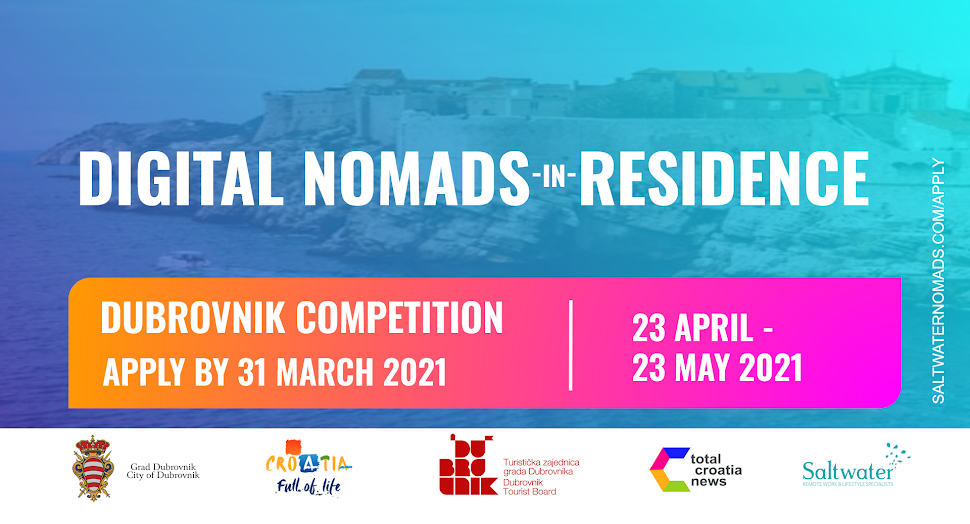
TCN is teaming up again with Saltwater, the City of Dubrovnik, and Dubrovnik and National Tourist boards with the Dubrovnik Digital Nomads-in-Residence competition, with applications closing on March 31.
For the latest news about digital nomads in Croatia, follow the dedicated TCN section.
Americans in Croatia: From Short Hvar Stay to Digital Nomad Visa Success
March 7, 2021 - Americans in Croatia are very welcome guests, and many would come for long if it was possible. It is now, if you are a remote worker. Meet Jessica Romano from San Francisco, officially the first approved digital nomad on Hvar. Congrats and welcome!
"As you probably know, Paul, Americans in Croatia can only stay for a limited time. We LOVE Jelsa, and your apartment is really great, and we would rent it through the winter if we could stay. I read on TCN about this digital nomad visa? Is it coming soon? Do you think I could get one?"
Americans in Croatia - from a temporary stay in Jelsa to a 12-month permit.
That was back in early November when Jess and Thibaud rented our Panorama Penthouse Jelsa apartment for a couple of months. Some nice and unexpected income so late in the year. And there would be more rental income out of season if they were allowed to stay longer. Currently, Americans in Croatia can only stay 90 days at one time.
So there we were, in a situation where we both wanted to engage with Croatian bureaucracy (my favourite hobby) to get a result for Jess. She and Thibaud are amazingly thoughtful and respectful guests, even baking cookies for my punica, which makes me a little bit cooler in my punica's eyes by association.
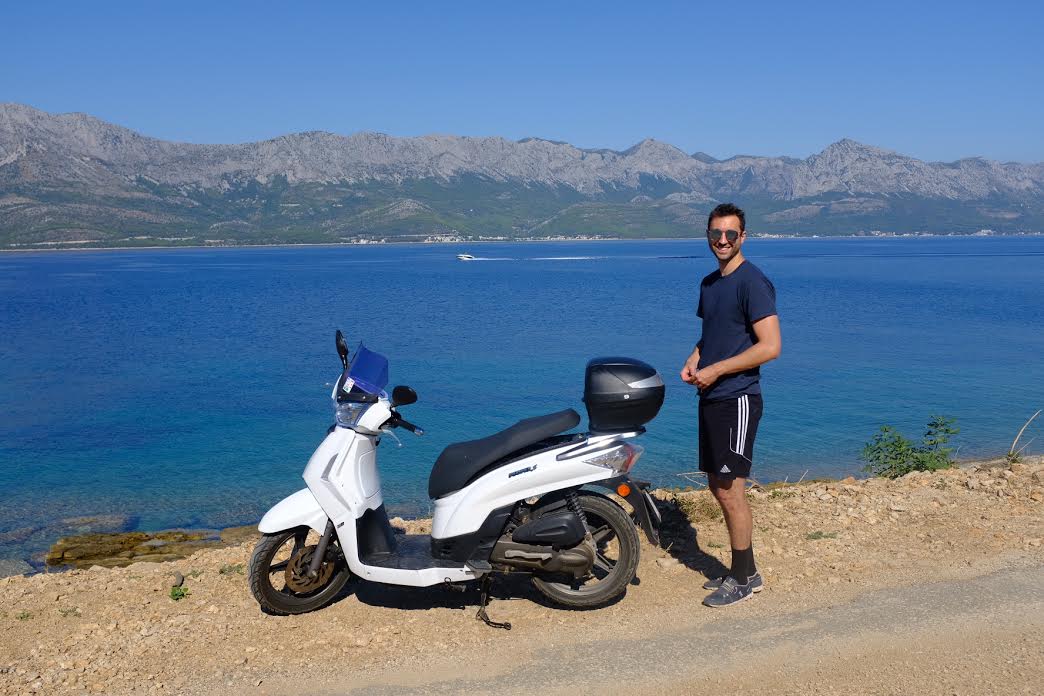
I helped where I could, as did several others. It seems that Jess and Thibaud have been a hit in the Jelsa community, helping several people, as well as bringing a little colour and fresh perspective to the long Dalmatian winter.
And yesterday, some great news, as Jess informed me that she heard back from the authorities at MUP and has been approved for a 12-month stay.
Great news and congrats. Jess kindly took the time to tell me more about, winter in Jelsa, and what the visa means for her.
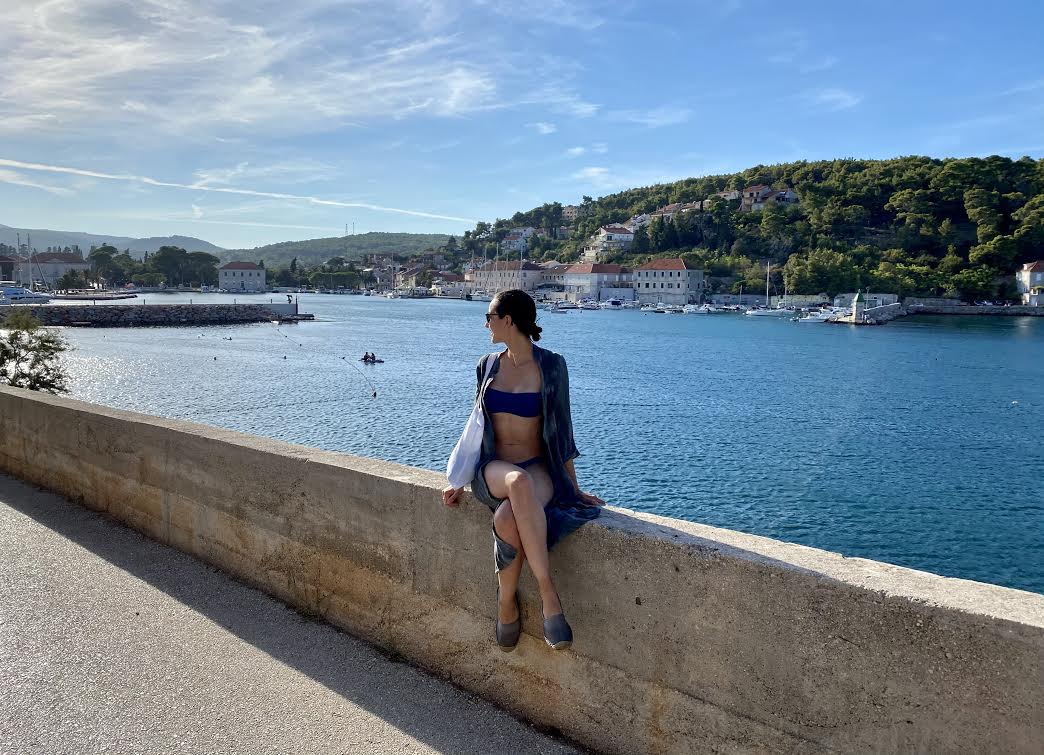
Firstly, how are you enjoying winter on Hvar? Has the reality been a little different to what you were expecting? In what way?
I’ve been enjoying it - Hvar is beautiful year-round! I didn’t have many expectations heading into the season, especially as Covid-19 dragged on into 2021. Due to pandemic restrictions, most restaurants and cafes were closed, and people haven’t been out very much. Since this is my first winter season on the island, I don’t have a point of comparison; generally, the slow pace and absence of crowds has been great. The weather and temperature has been mostly mild, but I was surprised by 1-2 week-long rainy stints. We are familiar with jugo and bura by now. I told friends here that I’ve felt quite tired during jugo, and they said that I’m officially a local now. Alas, those cloudy periods make the sunny days even more wonderful. It can get quite warm when the sun is out - if you haven’t looked at the calendar, you might think it’s summer at times! I’ve spent a lot of time outdoors - hiking, walking, rock climbing & running - and recently bought a car to explore the island. I feel as though you could live on Hvar for years and not discover all of the unique villages, ruins, beaches and trails here. Even though most wineries are closed in the winter, some offer tastings by appointment, and I’ve stopped by local producers to pick up bottles to enjoy at home.
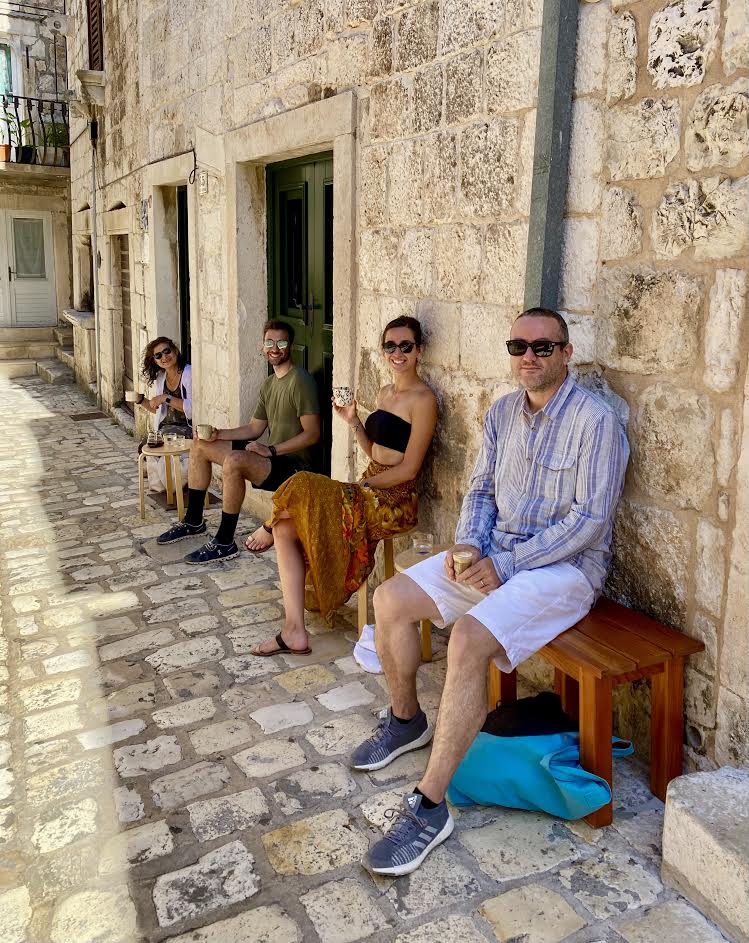
You recently became a TV celebrity - tell us about that experience. You did a great job promoting the digital nomad lifestyle to a domestic audience. I think a lot more people here now understand it better.
Who thought we’d ever be on Croatian TV?! Wow, what a fun experience. We were delighted when the Puls team reached out to feature us in their digital nomad series, and were especially excited to share our positive experiences in Croatia. We shot the film over a few days - at our apartment, in Jelsa & Hvar town, and near Zavala. Filming the reportage is a lovely memory for us, as was spending time with the producers, Maja and Jura. They are a joy to work with and made us feel very comfortable in front of the camera. The reportage captured moments of our everyday life. It also showed that digital nomads can benefit from living in Croatia and that likewise, Croatia can benefit from digital nomads integrating into the community. We are so grateful to the people of Hvar (and Croatia, as a country) for embracing us.
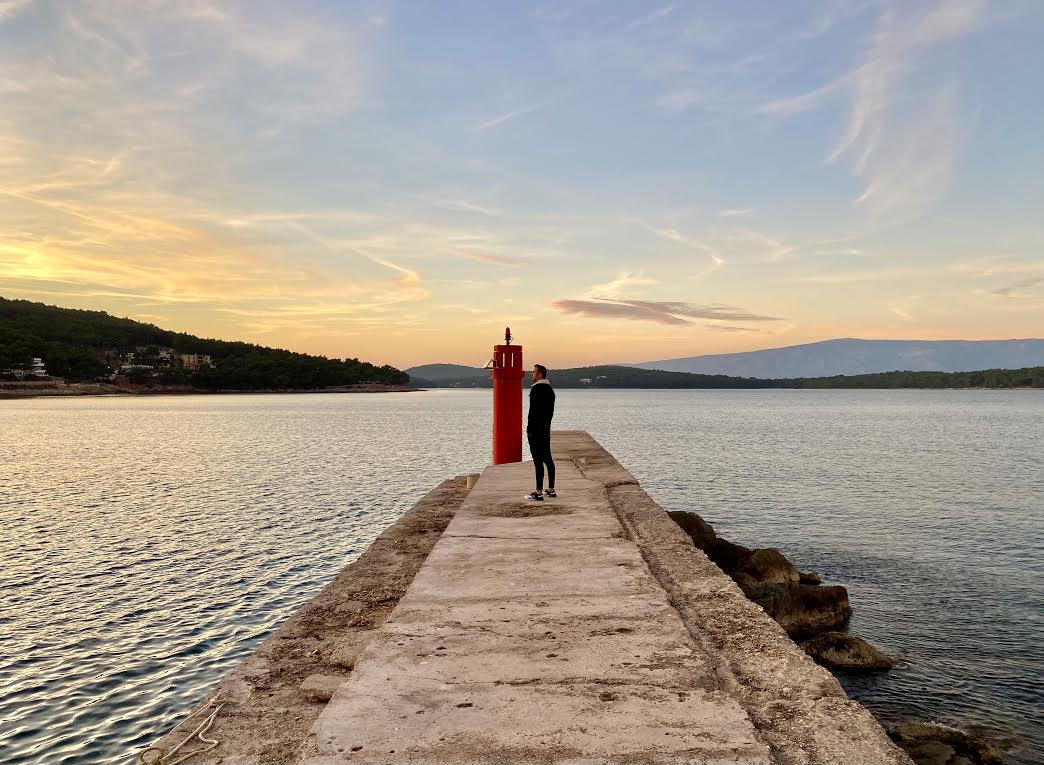
An American on Hvar. That can only happen for a finite length of time, normally, but you had good news come recently - your application for the digital nomad visa has been approved. Congrats! Tell us more.
Puno hvala! It’s exciting to be one of the first people to receive approval for Croatia’s new digital nomad visa. It is rather incredible that Croatia created and approved the digital nomad visa in such a short period of time.
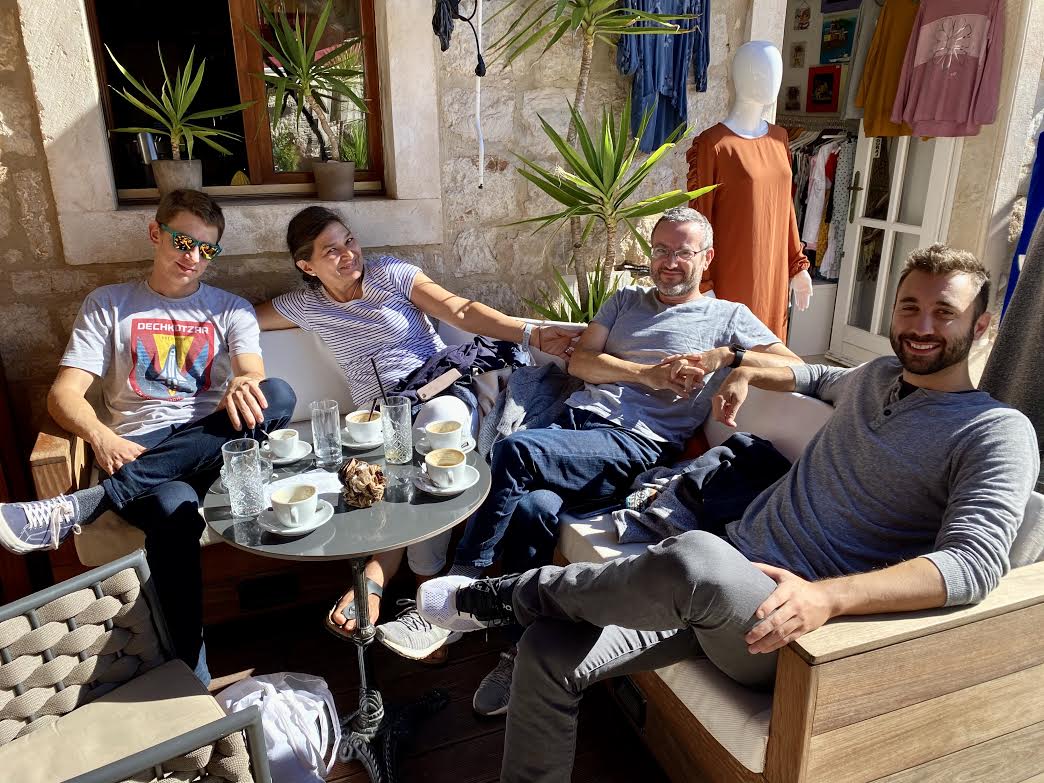
Tell us about the process and what you needed exactly?
Since I had already obtained a temporary residence permit and some of the requirements overlap, the change was relatively simple. I applied shortly after the visa was announced in January and submitted my paperwork through the Hvar police station. Shout out to Ivana for helping us through the process! The digital nomad visa is new for everyone, the MUP and applicants alike, so it felt like we were all learning together. I provided proof of employment (on official company letterhead), proof of health insurance (foreign and travel), proof of income (pay stubs), the completed application form, a copy of my passport and a small photo for the ID. I paid a fee - if I recall correctly, it was 600kn plus 70kn in stamps. I signed a document to request the revocation of my temporary residence permit in order to apply for the new visa. The MUP provided me with a document stating that I was legally in Croatia while ‘between’ visas. The whole process took 4-6 weeks. Big thanks to all of our friends and acquaintances who advised me through the process, including you(!) and Jan de Jong.
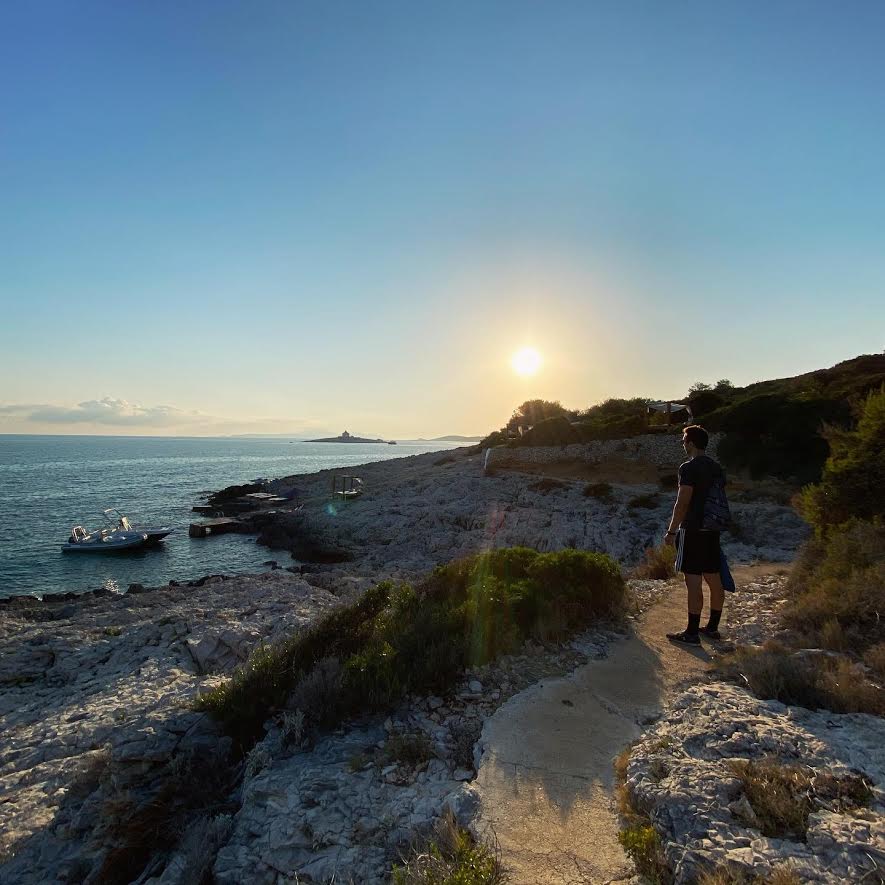
What exactly does it mean for you and your lifestyle to now be able to stay in Croatia for 12 months?
Being able to stay in Croatia for an extended period of time means two big things for me. Firstly, I have more options on the table regarding where I want to live and work. Secondly, it actually provides some stability as we all enter a post-pandemic world. Like many people, my life shifted in 2020 - there were circumstances I couldn’t control but there were choices I could control. One of those choices was to relocate to Europe. My original intent was to stay for a few months and then travel around the continent but I wanted to stay in Croatia. After my tourist visa expired after 90 days, I applied for and was granted a temporary residence permit. The digital nomad visa provides a longer-term solution for staying in Croatia and removes the stress and uncertainty of having to re-apply for extended temporary residence. Now I don’t have to worry about leaving Croatia for a year and can focus on my life and work here. Something I didn’t fully realize before landing in Croatia is that it takes several months to settle into a new place. Getting comfortable with the environment, people, way of life - it all takes time. Having the option to stay for a year gives me the opportunity to more deeply explore the culture and what it would be like to live in Croatia long-term. I wouldn’t be surprised if other digital nomads choose to lay down roots in Croatia - either through starting businesses, buying property or becoming part of the community - because they have the chance to spend sufficient time here before making those decisions.
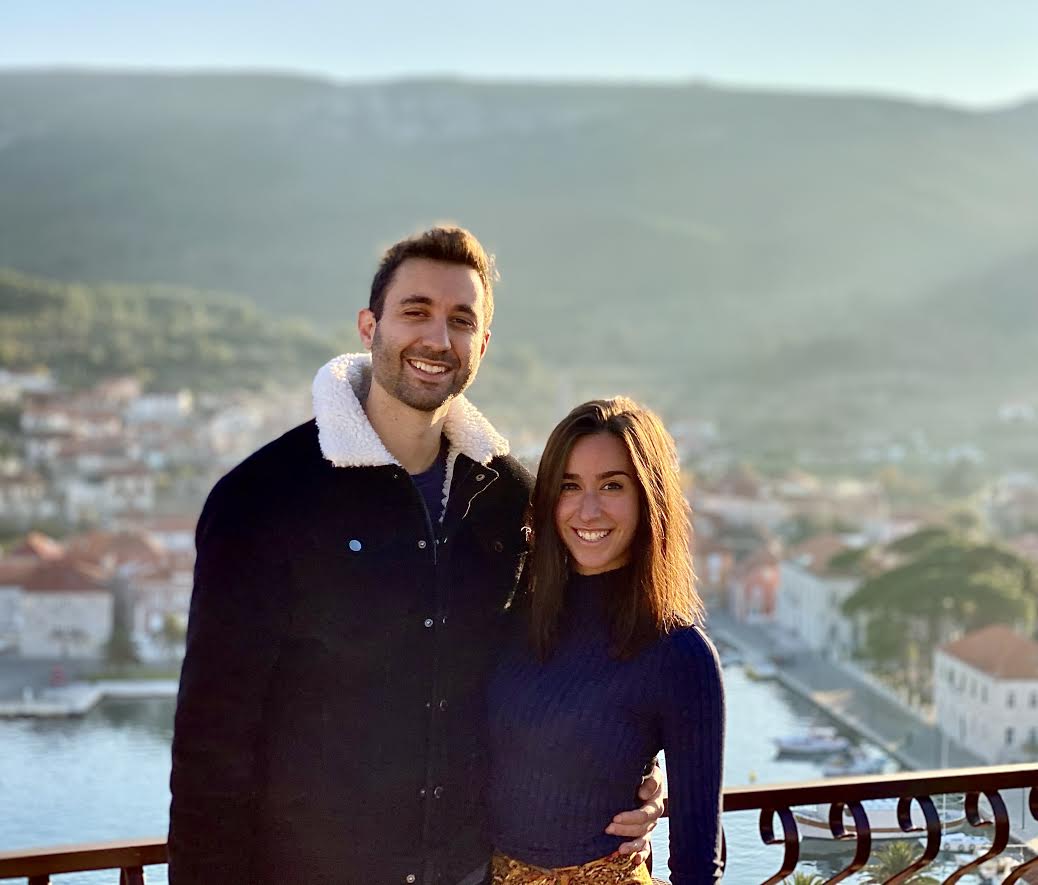
What message do you have for fellow international remote workers about life in Croatia off-season. What are the pros and cons?
Croatia is an excellent option for digital nomads all year-round. It’s worth noting that my perspective is based on spending the majority of my time on Hvar - which is a place that I’ve grown to love and can recommend highly! But from what I know, there are many awesome destinations within the country, and there’s somewhere for everyone. Big cities, tiny villages, and everything in between - as well as over 1000 islands (though not all of them are inhabitable). The landscape varies vastly across the country, from mountains to farmland to (a very long) coastline. I was slightly concerned about being able to find a high-speed internet connection, but it’s not been a problem. Most Croatians I’ve met are willing to speak English, so there is no language barrier in terms of being able to get around and communicate generally. Every location has its perks and quirks - as long as you are determined and have an open mind, you’ll be able to make it work. There’s heightened energy and tangible efforts around making Croatia a premier destination for digital nomads, making it a great place to be right now.
Here is the great feature on Jess and Thibaud which aired on Croatian primetime TV on HRT Puls.
If you want to learn more about their story, they gave a great interview on TCN back in December, when the digital nomad opportunity was still not officially in place. Read Digital Nomad Life in Croatia: Jess and Thibaud, from San Francisco to Jelsa.
That means that there are now at least two Americans in Croatia with the digital nomad visa. Meet the first-ever recipient of the visa - Meet Melissa Paul, Owner of Croatia's First Digital Nomad Visa.
Are you a digital nomad who would like to spend 4 weeks as a guest of the City of Dubrovnik? Learn more in Dubrovnik Launches World's First Digital Nomad-in-Residence Competition.
For the latest news and features about digital nomads in Croatia, follow the dedicated TCN section.
How many Americans in Croatia are there? We are looking to do a series on Americans in Croatia, so if you are here and would like to be featured, please contact This email address is being protected from spambots. You need JavaScript enabled to view it. Subject Americans in Croatia.
From Phylloxera to Apartmentisation, the Road to Nomad Land
March 6, 2021 - It is always a pleasure to publish the thoughts of Zoran Pejovic, one of Croatia's most respected tourism professionals. A word of warning to those rushing into the digital nomad tourism opportunity, looking back at the examples of phylloxera and apartmentisation.
At the end of the nineteenth century, the good people of Dalmatia got the word that the big wine-producing countries, France, and Spain primarily, lost almost all their vineyards due to the small but mighty pest called phylloxera. They rushed and dug all their olive groves, fruit orchards, and gardens and planted vines, hectares and hectares of vine, thousands of hectares. What followed was several years of amazing growth. The prices were going up and it seemed that the panacea for all the hardships of the hardworking people of the Adriatic coastline was in hand. Well, we know now that it was a terribly bad idea. Some people knew it at the time as well, but their voices could not be heard, as people did not want to hear it. Phylloxera reached our fine shores as well and wiped out all those thousands of hectares of the recently planted vineyards which led to a great famine and mass emigration to the Americas and elsewhere. In the meantime, French and Italian and Spanish growers “vaccinated” their vines by grafting them on the resilient American roots, and their life and wine production resumed. Ours almost came to a halt.
At the start of the twenty-first century, the good people of Dalmatia got the word that many of the countries that we saw as our competitors in the tourism industry disappeared from the map, mainly due to the geopolitical turmoil, wars being waged in the vicinity or some other factors that made them unsafe to travel. So, we rushed and turned all our houses, apartments, and garages into summer rentals. What followed was several years of amazing growth. The prices were going up and it seemed that the panacea for all the hardships of the hardworking people of the Adriatic coastline was in hand. Well, we know now that it was a terribly bad idea. Some people knew it at the time as well, but their voices could not be heard, as people did not want to hear it. Coronavirus reached our fine shores and wiped out our touristic output by 75%. The apartments for the major part are sitting empty and will probably do so second season in a row, and people are looking for the best emigration options.
The latest panacea on the shelves of the pharmacy of our lives is called “digital nomads”. Apparently, the big cities of the world are not the most pleasant places to be in and live in right now, and people are going to rush to our fine shores and set their IT shops and office, sip wine on the balconies of those empty apartments and leave us their money. People are digging trenches and bringing optic fibers to their houses on the islands, believing that with the high-speed internet connection and the unbearable blueness of our seas and skies it will be impossible to resist the call to join the movement of digital nomadry. While in essence a good idea, and a good PR stunt, albeit not nearly as good as the one from Dubai or some Caribbean islands, and one that I support in terms of legislation and easing of the bureaucratic burdens, I cannot help but feel like we are doing the same things all over again.
We keep looking for new trends and perhaps new directions, without ever establishing a clear identity. The digital nomad program cannot be our identity. It can perhaps be one of the trends or one of the directions we take, but it must stem from the strong, well-built, and easy-to-understand industry identity. We will not be able to build the identity until we understand the progression of economic value, from commodities to experiences and transformations. You simply cannot skip the steps and expect that the entire thing does not falter like a house of cards at the first sign of trouble. We have learned how to commoditize sea and sun, and that to a point only. How those commodities make goods that deliver services that set the stage for experiences that guide transformation is still to be understood for the vast majority of those who pertain to play the part in this industry of people aggregation, travel, tourism, hospitality, leisure, and all connected industry spin-offs. This is obviously not a problem of those who promote this program, which to reiterate once again, I fully support, but of those who keep looking for simple solutions to the complex problems. This a general human characteristic, but sometimes it feels we excel at it a bit more than the others. This will be short-lived solution, until next one surfaces and then we will all rush to root out our vines and plant the lavender. Oh, wait, that has already happened as well!
You can read more of Zoran's writings on TCN here.
For more about the digital nomad scene in Croatia, follow the dedicated TCN section.
Dubrovnik Launches World's First Digital Nomad-in-Residence Competition
March 5, 2021 - Just a few months after hosting Croatia's first-ever digital nomad conference, Dubrovnik launches the world's first digital nomad-in-residence competition. Come help shape the remote work strategy of Kings Landing!
Few places in Croatia have been as badly affected by the pandemic economically as Dubrovnik, Croatia's best-known and most iconic city, also known as the Pearl of the Adriatic. Heavily dependent on flights and cruise ships for the bulk of its tourism, COVID-19 wiped out those markets, leaving a city almost devoid of tourism and looking at ways to adjust to the new normal.
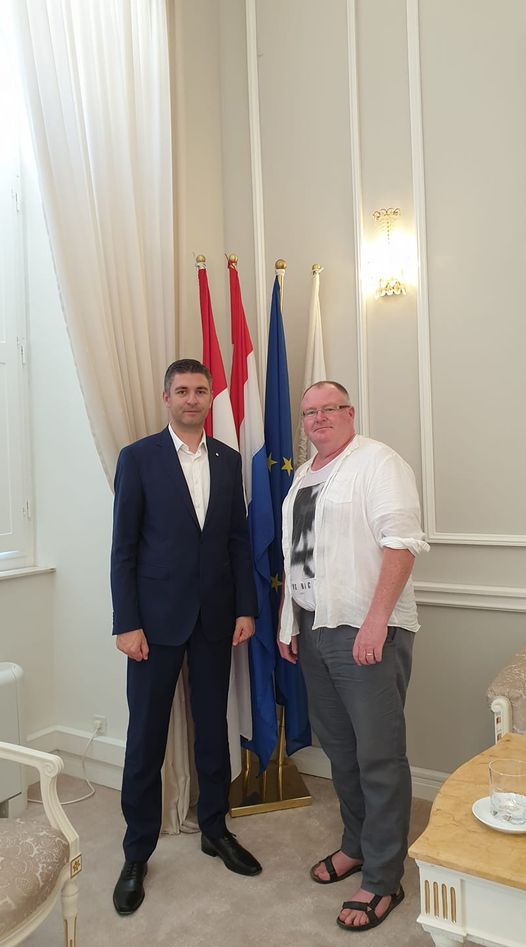
I first met Mayor Mato Frankovic in July last year, when I pitched the idea of reorientating part of the city's tourism around lifestyle, catering to the growing number of remote workers around the world, who were looking to experience lifestyle when they leave their remote offices each day. After a hard day's work, how better to relax than with a coffee on Stradun or a stroll around those magnificent old city walls?
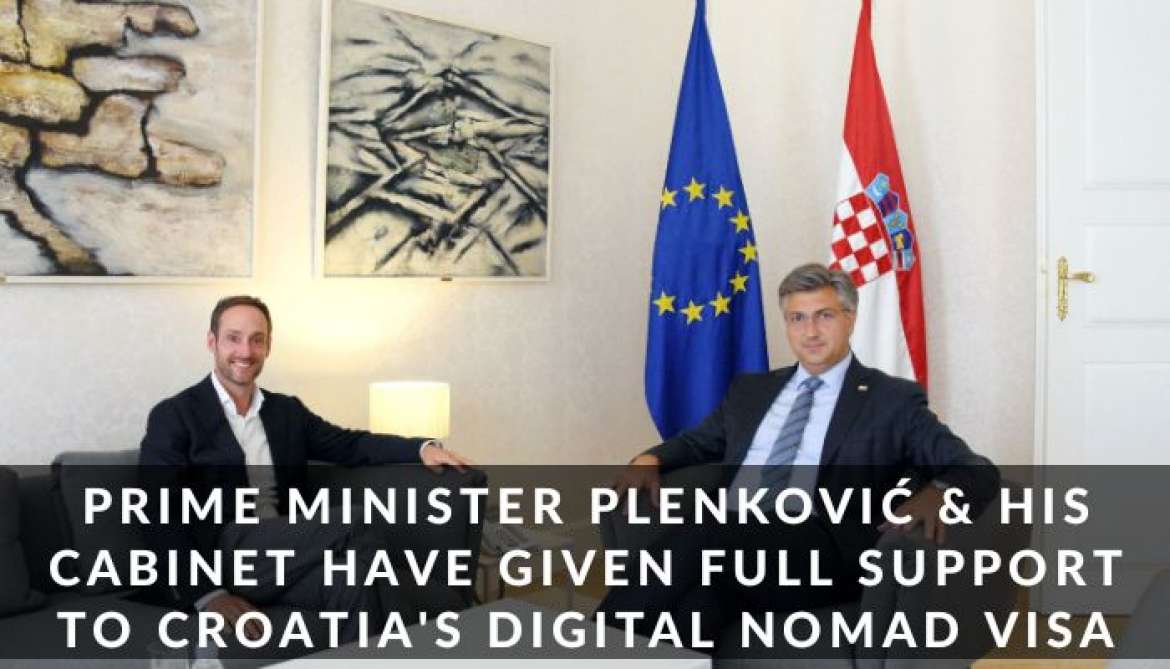
The digital nomad story in Croatia was just starting to get some traction. Dutch entrepreneur Jan de Jong had just sent his open letter to Prime Minister Andrej Plenkovic, asking him to introduce a digital nomad visa for Croatia. Some 44 days after that, Plenkovic tweeted a photo with Split's favourite Dutchman announcing his intention to do just that. The tax code and Foreigner's Act were amended, and from January 1, 2021, the legal framework was in place to welcome digital nomads for 12-month stays. Soon after, an American in Istria became the first bearer of the new visa. Meet Melissa Paul, Owner of Croatia's First Digital Nomad Visa.
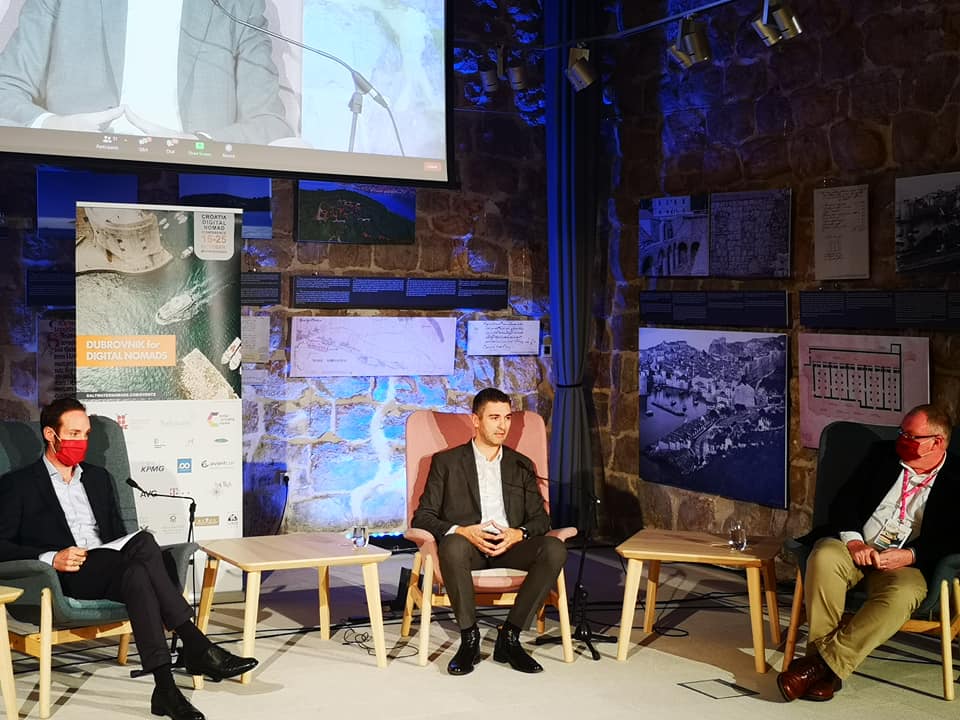
(Jan de Jong, the driving force behind Croatia's digital nomad visa, Mayor Mato Frankovic, and TCN's Paul Bradbury at the Dubrovnik for Digital Nomads conference in October 2020)
Dubrovnik's engagement with the concept of developing a strategy for digital nomads led to the first dedicated conference in Croatia back in October. Organised by local remote work specialists, Saltwater Nomads, the Dubrovnik for Digital Nomads conference reached a global audience, including a citation in The Washington Post. Coupled with Croatia's more accommodating approach to tourists durig the pandemic, the message was clear - Croatia's lifestyle and natural beauty were very appealing. The perfect base for remote workers looking for a little extra.
Dubrovnik's beauty and lifestyle got an extra boost in August, as ABC News spent a week covering the topic of Americans travelling during corona times, and the feature above on Good Morning America was watched by 12.5 million people.
Keen to build on the strong foundations of the October conference, the City of Dubrovnik and Dubrovnik Tourist Board have been working closely with Saltwater Nomads to develop a strategy to enable the city to better serve its remote working visitors, as well as better positioning Dubrovnik in the market.
As part of that strategy, Saltwater owner, Tanja Polegubic, a Croatian returnee from Australia who has been serving digital nomads since setting up Saltwater in 2017, has come up with what we believe is the world's first digital nomad-in-residence contest, bringing digital nomads from all over the world for four weeks in Dubrovnik to work with the city to help it deliver a better understanding of the needs of its remote working guests, as well as using their know-how to help Dubrovnik build a better brand and presence in this rapidly expanding sector.
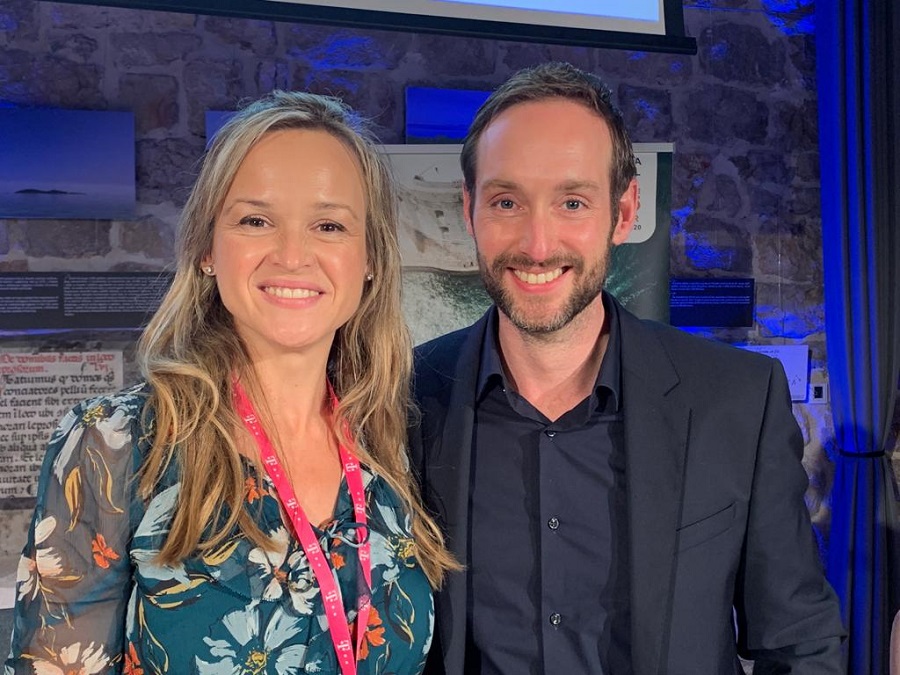
(Competition organiser and remote working pioneer in Croatia Tanja Polegubic also organised Croatia's first digital nomad conference in Dubrovnik in October. Jan de Jong was a keynote speaker. Both are founding members of the Digital Nomad Association for Croatia).
The conference was one of my personal and Professional highlights of 2020," Tanja told TCN. "It’s been really wonderful to see new businesses spring up - and mention the conference and the news of The permit. The DN-I-R residency program will be reaching out to these “early adopters” to be involved. Our approach is co-creation. We will pair the digital nomads to Match global Trends with the local community - I’m really excited about what we’re going to roll out!
The digital nomad-in-residence (DN-I-R) contest will give 10 lucky winners a complimentary 4-week stay as guests of the city, with various meals, tours, workshops and other activities also included. From the Saltwater contest information:
Using a co-creation model, the Saltwater program team will bring together residents and the 10 digital nomads selected as DN-I-Rs. Over a four-week period, the digital nomads will attend design thinking workshops to create a strategic direction for the city, especially as it adjusts to a more sustainable direction and manages the impact of COVID19.
The competition even allows companies to nominate a star employee - as long as they also agree to terms and conditions if selected. As many digital nomads are couples travelling in Croatia, if a winner has a partner - they can apply and if one is selected can share the free accommodation.
The project, which commences on April 23, will enable the 10 lucky winners to collaborate, upskill, and contribute to the development of Dubrovnik's digital nomad strategy, with the aim of enhancing Dubrovnik's standing in the digital nomad community. Dubrovnik has a reputation of being expensive, which it certainly can be, with a perception among some that there is little to do outside the city walls, which is certainly not true. The exchange of minds and experiences will help to dispel some of these myths.
DN-I-Rs will receive professional development training, participate in workshops and present their findings on shaping Dubrovnik as a Digital Nomad Friendly city. This will be presented at a finale event at the end of the programme. The Digital Nomad Association (DNA) Croatia will also be involved - with an event incorporated into the end of the programme.
Mayor of Dubrovnik Mato Frankovic is looking forward to working with the city new international digital ambassadors:
Dubrovnik really has everything one could wish for a comfortable life, but also excellent working conditions, and the City of Dubrovnik is constantly working to improve the quality of life and stay in this city. Digital nomads are very welcome. I believe that the conference we held in Dubrovnik last October clearly conveyed that message. With these further activities we want to emphasize this even more, and we see that in the international community Dubrovnik is already recognized as a desirable destination for digital nomads. The digital nomad story has the support of the Government of the Republic of Croatia, which is reflected in the fact that visas for nomads were introduced, as announced.
I wish all competitors the best of luck, and the winners of this competition will certainly gain wonderful experiences in Dubrovnik and, I am sure, be the ambassadors of Dubrovnik in the world.
An innovative approach to a new tourism strategy, so why not get involved? If you are a digital nomad and would like to be a guest of Dubrovnik and assist in shaping its digital nomad service for future guests, now is your once-in-a-lifetime chance!
Applications are open from midday today until March 31. More details on the programme and the application requirements and procedure can be found on the Saltwater website.
Learn more about the magic of Dubrovnik in our fully updated Total Croatia 2021 Dubrovnik in a Page guide.
For the latest news about digital nomads in Croatia, follow the dedicated TCN section.
Croatian Digital Nomad Online Application Form Launched
March 1, 2021 - An important milestone as the Croatia digital nomad online application form is launched in English and Croatia by the Ministry of Interior.
The next phase of the digital nomad story in Croatia is complete, as the Croatian digital nomad online application form has been added to the official website of the Ministry of the Interior.
Visitors to Croatia last year will be very familiar with the website, as it was also the place where the hugely successful Enter Croatia form was hosted, which helped speed up border crossing times considerably.
As with the Enter Croatia form, there are bound to be some initial teething problems, which will hopefully be quickly ironed out as they were with Enter Croatia back in May.
The launch of the online application option is the latest in a very swift (at least by Croatian standards) introduction of the digital nomad visa for Croatia.
It was only on July 11 last year that Dutch entrepreneur Jan de Jong wrote an open letter to Prime Minister Andrej Plenkovic requesting that Croatia introduce the visa. On August 25, following a meeting with de Jong, Plenkovic tweeted his decision to introduce the visa, and proposed changes in legistlation were put before Parliament the very next day.
Changes to the tax code and the Aliens Act at the end of last year provided the legal conditions for digital nomads to regulate their stay for a 12-month period, provided the appropriate conditions were met.
An American in Istria became the first digital nomad to successfully apply in late January - you can read her first interview here: Meet Melissa Paul, Owner of Croatia's First Digital Nomad Visa.
We will bring you more on the process shortly, but for now you can check out the Croatian digital nomad online application form here.
For the updated requirements to apply, check out Croatia Publishes Updated Digital Nomad Visa Requirements.
For the latest on the digital nomad scene in Croatia, follow the dedicated TCN section.
And for a taste of digital nomad life in Croatia, watch how this couple from San Francisco is adapting to winter life on Hvar.
Croatian TV Showcases the American Digital Nomad Hvar Lifestyle in Jelsa
February 26, 2021 - What happens when you blend American digital nomads with the Hvar lifestyle? As HRT Plus reported last night, it is something close to heaven.
It is rather a strange feeling watching your home on national television with someone else living in it, but what a lovely report from Maja Zrnic for HRT Puls which went out on primetime television last night.
With all this talk of digital nomads, what is the reality like, and how is the Hvar lifestyle for digital nomads from the USA in Jelsa during winter, for example.
A few weeks ago, we published a really great interview with Jess and Thibaud, who have been in Jelsa for a few months and are in the process of applying for the digital nomad visa. You can read the interview in Digital Nomad Life in Croatia: Jess and Thibaud, from San Francisco to Jelsa.
Soon after, Maja contacted me and said that was interested in doing a TV story on the couple. Introductions were made, new friendships forged, and Maja captured the Hvar lifestyle through foreign eyes in this ten-minuted feature, which aired last night. It is almost all in English with Croatian subtitles.
And yes, I did feel a little homesick, not only for the Panorama Penthouse Jelsa apartment that was our home before we moved to Varazdin. But also a little nostalgic for those magical winter months on Hvar.
Maja did a really great job bringing out the Hvar lifestyle in the piece, and it offers a glimpse of how community life can slowly be enriched with the arrival of international digital nomads, who work through their laptops by day (or, in some cases due to time zones, by night) while fully integrating with the local community once work is finished.
Read more about digital nomad life on Hvar in Hvar Digital Nomad Life with Kids: an Emerging Lifestyle.
For more news on digital nomad topics in Croatia, follow the dedicated TCN section.
How Can Hotels Truly Serve Digital Nomads in Croatia?
February 26, 2021 - Digital nomad hotel offers are on the rise in Croatia. Tanja Polegubic of Saltwater Nomads and organiser of Croatia's first dedicated conference, Dubrovnik for Digital Nomads with some great advice on what hotels can do to truly serve digital nomads.
Pivots are increasingly common in the COVID19 era. Hotels are no exception.
In Croatia, especially the tourism sector, a lot of businesses are looking at catering to Digital Nomads. It’s no wonder hotels are here, too. And yet — they have polar pros and cons.
However, there are ways hotels can adjust immediately, and over time to create the best offer possible. These points are covered at the end of the article:
- Injecting Soul.
- Food. (Part1and2).
- Upgrades.
- HappyHour.
- Learningandengaging.
Why are hotels now doing this?
- Croatia has introduced a digital nomad permit, allowing tax-free stays for 1 year.
- It’s a great place… and can have a year-round offer - filling many empty coastal hotels closed in the “off-season”.
- Digital nomads are looking for long-term stays.
CAPTION: Soo and Chris —2020 Saltwater members were recruited to model for Marvie Hotel Split’s longstay deals for digital nomads in Croatia
The backstory.
What were hotels doing before COVID?
Many hotels already had ‘business centres’ or small areas for people to work in rooms or common areas. This isn’t a cowork, or a hub concept, it was a place to plug in. Maybe print things. End of story.
What was interesting by 2019 was the rise of coworking - gaining the attention of hotels. And entire hotel chains were moving into this direction. I recall reading in May 2019 about Accor group launching over 1200 spaces in Europe with Wojo as a coworking partner.
Later that year, (still pre-COVID), our business, Saltwater, partnered with Davina at Residence Stine and soon to open Heritage Hotel Fermai. They immediately said ‘yes’ to longstay packages for remote workers, and jointly offered the Breakfast Room (a glass garden oasis in the heart of Varoš in Split) as a coworking space.
CAPTION: July 2020, our coworking partnership with Residence Stine’s indoor-outdoor glass garden
We launched in COVID19, and I recall the first member ordering breakfast on his first day, as he logged on to read emails. I was concerned it would seem a bit odd —but for 8 euro (and no dishes to wash) it was actually a bonus, and an efficient start to the day.
Due to COVID19, and Summer not being the ‘season’ for digital nomads in Split (expensive rentals), that was that. Until Jan de Jong came in and the digital nomad visa permit was born. Remote work was truly mainstream. Globally.
You know the rest.
COVID-ERA PIVOTS
The first I heard of a global pivot was a partnership announced in July 2020 between Wythe Hotel Brooklyn and Industrious —one of the most respected cowork chains now that WeWork… well, didn’t work! The Wythe Hotel converted entire suites into offices. I was at the Wythe in 2013, and this is a hotel with a rooftop looking out on Manhattan, with a lot of events, including business speakers. The Australian American Association actually held events there, which is what brought me there for a talk by the Australian (and female) co-founder of Van Leeuwen ice creams. I digress… but it clearly demonstrates this is a space which knew back then how to get in non-hotel guests — which is something Croatia does not do well.
This will hopefully change.
THE FIRST COVID OFF-SEASON IN CROATIA.
I read the first stories of hotels starting to offer long-stay options in Croatia toward the end of October last year.
There were a few glaring issues here.
These were places in ghost towns, with probably a very stark hotel restaurant, and at a time when apartment accommodation would be much cheaper - and come with a kitchen.
While it was good to see a shift to accept a remote work audience, it was, for the most part, a misinformed approach. Retrofitting a guest with specific needs to an unsuitable space, and, no community vibe. I’d be interested to see the reviews and data on those places.
What could they do better?
Know these aren’t spaces built for long stay, but work to their strengths, and make adjustments as needed, after testing.
This is a transitional period. Some, like the Wythe Hotel, will need to convert floors into offices if they are to attract this audience. Or at least create a new space from unused conference halls. Hot tip: not the dark, basement room. Just because it is empty - does not make it a good place to sit and work for 8 hours.
This is a common mistake.
There is something about a coworking space, when done right, will make you actually enjoy going to work. It’s the decor, sure. Location, and if lucky, a very short commute.
Above all, it’s the people.
DISTRIBUTED TEAMS
A recent digital nomad member we hosted at Saltwater is a specialist in distributed teams. We were chatting by the watercooler one day — and he said something which really struck me, (even if I have to paraphrase).
“Everyone is feeling so isolated, working from home right now.
When the ‘off-sites’ start happening — workers don’t want a sterile hotel vibe, and to once again, “isolate” in their hotel rooms and the ‘polished’ pool feel and staff. They want connection. They want the shared house style option, where they can do things like prepare a meal together.
Connect — and join local gatherings.
It’s not rocket science. It’s what we do every day, to ensure members get value. So here’s a quick checklist:
IF YOU’RE A HOTEL
- Inject some soul. Hold events for non-guests. There are hotels with a health and wellness angle such as Marvie in Split, or weekly live music nights at family-owned Hotel Park Hvar. I visited waterfront Hotel Split in Podstrana last week — which have an existing artist-in-residence program, where a local artist comes in for a few days, and the works are displayed around the hotel and for sale. Events, such as the Wythe Hotel program, will bring the community vibe you need. And you can make it easier, by offering it to the public to hold events, to take the load off your staff.
Opening up doors to non-guests — especially ones who live in your region, not just conference bookings by international M.I.C.E. arrivals, not only advertises your hotel to a wider audience, it will show the local commitment you make, which is valued by digital nomads. And the locals will become ambassadors will get to know, and ultimately be the ones to recommend your venue.
Food — part 1. Self Catering.
Living in a room with no kitchen for a month, with makeshift Mr Bean style sandwich making, isn’t appealing to everyone. Most hotels only have a tiny bar fridge. And the costs of constantly ordering in or dining out (to your wallet and health) is a challenge for hotels to overcome. Consider adding larger fridges and simple food preparation options in rooms: a cutting board, cutlery, plates, bowl and tea towels. And a system for collection and cleaning. Kind of like a DIY room service.
- Opening a meals area — eg. if your pool or a bar area is closed in winter, a small kitchenette is ideal, and maybe already installed or can be relocated. Common meal prep areas are…common, for digital nomads.
Put yourself in people’s shoes: if you had to stay somewhere for a month, making a sandwich, smoothie or salad could make you feel more at home.
Food — Part 2. Group meals.
Give guests the chance to meet each other. Things like a weekly group-contributed barbecue outdoors is easy, and perhaps already at your venue. Or hold a set dinnertime and menu on certain days. Ensure there is a host joining the group from the hotel (not just a server!) or from your local community, and bring in ways for people to get to know each other; speed networking, a local speaker, open mic, etc.
Upgrades.
Consider — in time, adding kitchen fitouts in some rooms, or the outdoor barbecue example. A lot of hotels are trying to retro-fit digital nomads into their spaces. Sorry. You weren’t designed for long-stay — some things just do not work as your space is currently designed. Remote work is here to stay — an ergonomic chair in rooms (or on the menu) is now a necessity.
Massage and Happy Hours.
This tip was from Kashlee Kucheran of Travel off Path a keynote speaker at our Dubrovnik for Digital Nomads conference. Hotels in Mexico and the Dominican Republic were serving the remote working crowd in the peak of COVID by modifying their offer with long-stay pricing. The good ones offered services professionals usually might use — eg. a chiropractor or midday massage. Holding after-work happy hours. If you don’t have the in-house staff, invite local providers in to do this. Call your drinks rep to sponsor the event. Anything. Give something more than the room key.
- Learn. Ask questions. Jump on expat and digital nomad online groups. They’re on Facebook, LinkedIn, Slack…And offer something in return for people’s insights — like a discount. They may not stay a month, but a weekend getaway is appealing. And once they’re in, you’ll learn more about what can work.
A very long stay in a hotel may not be for everyone. If you are landing in a new place and want to get your bearings, some of the longstay deals hotels in Croatia are now offering are a real luxury way to start your digital nomad experience in Croatia. You might use it as a base to find your long-term rental, or just want to live it up for a month with room service, with somewhere like Dubrovnik as your office for the month.
I’m excited to see all these changes in Croatia, and happy to be working with the hotels who have been early adopters, reached out to us at Saltwater and seen how they can welcome this audience, and build the digital nomad community in places across Croatia.
It’s an interesting time for this sector in particular, and hotels are certainly an important part of elevating a city’s status.
If you found this interesting — and would like to learn more about how Saltwater can work with your hotel (through referring your long-stay accommodation package to our members or how to put in a coworking space), visit our website Saltwaternomads.com or reach out on LinkedIn.
This piece is modified from Tanja Polegubic’s blog on Medium. Reprinted with permission.
More on digital nomads:
Meet Melissa Paul, Owner of Croatia's First Digital Nomad Visa.
For the latest on digital nomads in Croatia, follow the dedicated TCN section.


